Vietnamese EFL Learners
VerifiedAdded on 2023/03/31
|16
|3747
|482
AI Summary
This study explores the motivations and attitudes of Vietnamese EFL learners in learning English as a foreign language. It discusses the impact of mother tongue on writing and analyzes the types of errors made by students in narrative, descriptive, and comparison writing. The findings highlight the need for teachers to be aware of students' language selection and learning styles, and for students to actively engage in mastering productive language learning strategies.
Contribute Materials
Your contribution can guide someone’s learning journey. Share your
documents today.
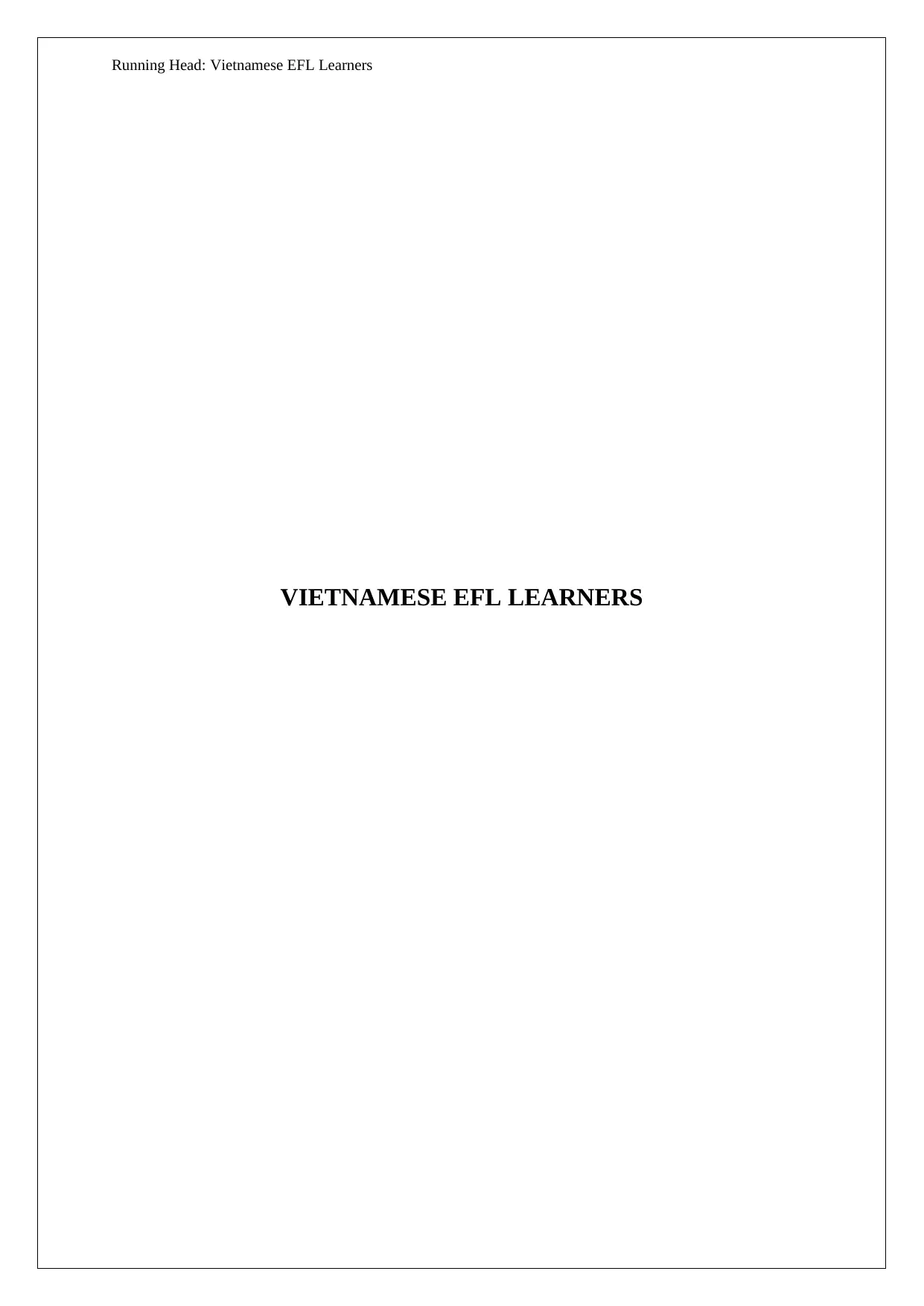
Running Head: Vietnamese EFL Learners
VIETNAMESE EFL LEARNERS
VIETNAMESE EFL LEARNERS
Secure Best Marks with AI Grader
Need help grading? Try our AI Grader for instant feedback on your assignments.
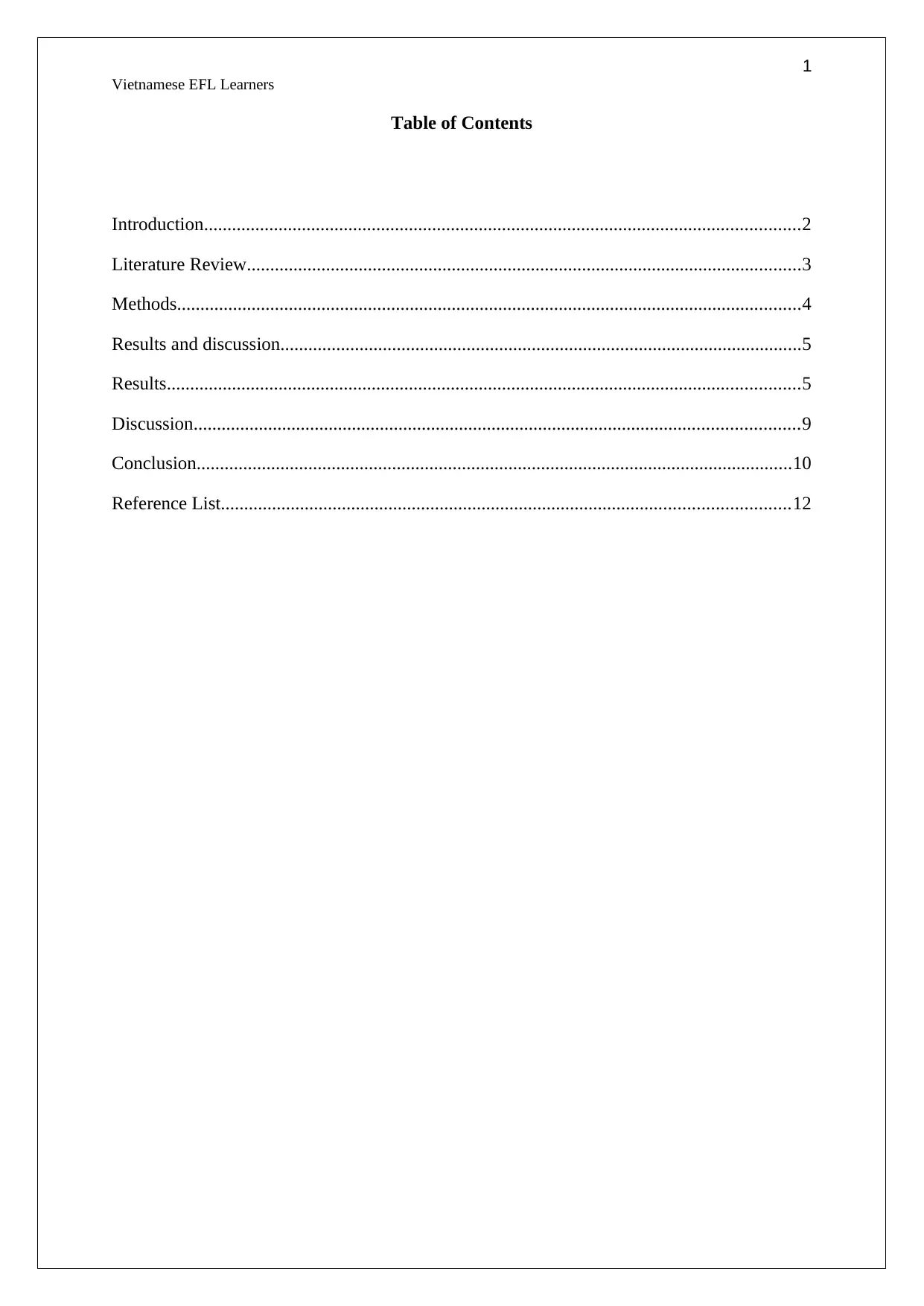
1
Vietnamese EFL Learners
Table of Contents
Introduction................................................................................................................................2
Literature Review.......................................................................................................................3
Methods......................................................................................................................................4
Results and discussion................................................................................................................5
Results........................................................................................................................................5
Discussion..................................................................................................................................9
Conclusion................................................................................................................................10
Reference List..........................................................................................................................12
Vietnamese EFL Learners
Table of Contents
Introduction................................................................................................................................2
Literature Review.......................................................................................................................3
Methods......................................................................................................................................4
Results and discussion................................................................................................................5
Results........................................................................................................................................5
Discussion..................................................................................................................................9
Conclusion................................................................................................................................10
Reference List..........................................................................................................................12
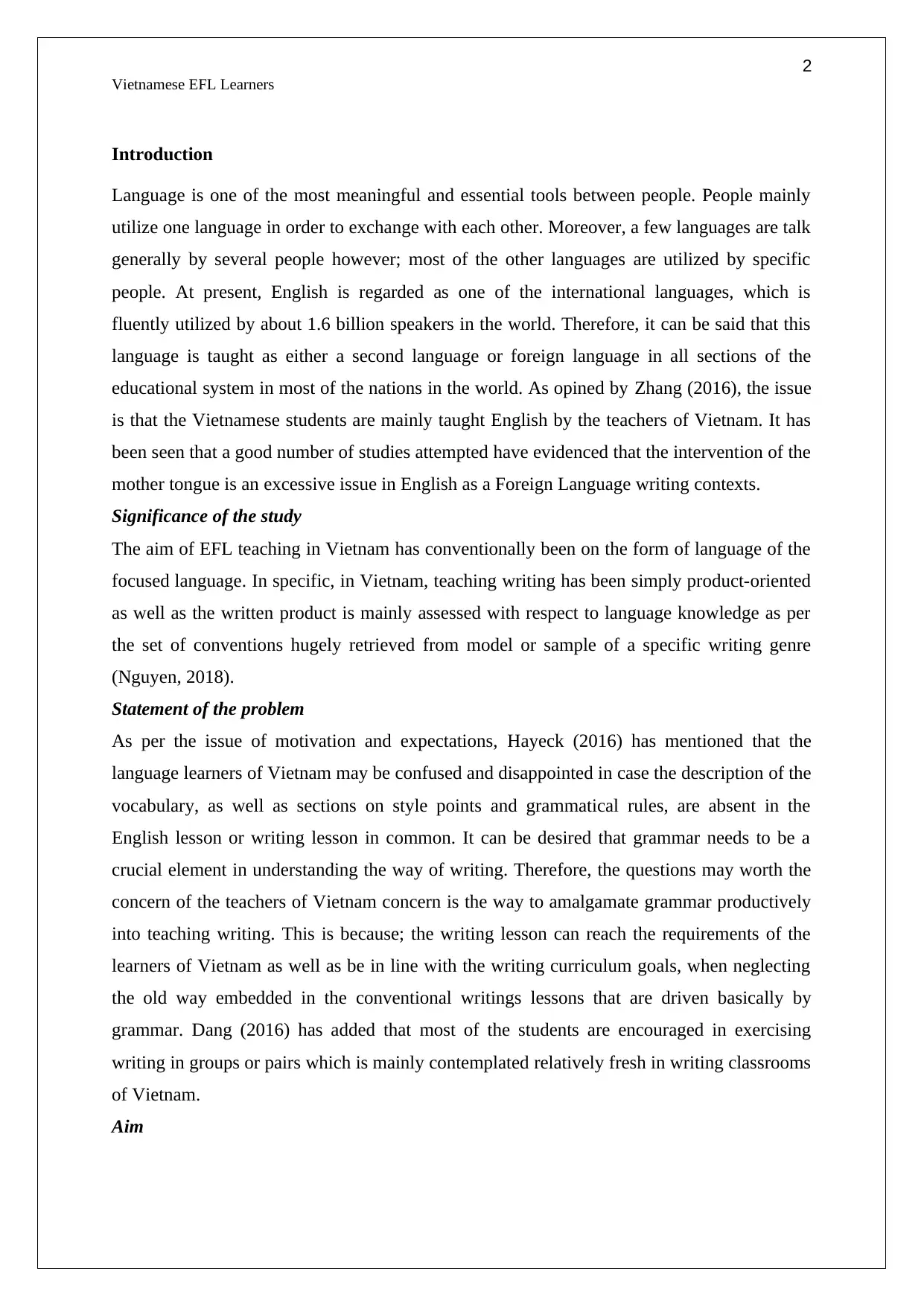
2
Vietnamese EFL Learners
Introduction
Language is one of the most meaningful and essential tools between people. People mainly
utilize one language in order to exchange with each other. Moreover, a few languages are talk
generally by several people however; most of the other languages are utilized by specific
people. At present, English is regarded as one of the international languages, which is
fluently utilized by about 1.6 billion speakers in the world. Therefore, it can be said that this
language is taught as either a second language or foreign language in all sections of the
educational system in most of the nations in the world. As opined by Zhang (2016), the issue
is that the Vietnamese students are mainly taught English by the teachers of Vietnam. It has
been seen that a good number of studies attempted have evidenced that the intervention of the
mother tongue is an excessive issue in English as a Foreign Language writing contexts.
Significance of the study
The aim of EFL teaching in Vietnam has conventionally been on the form of language of the
focused language. In specific, in Vietnam, teaching writing has been simply product-oriented
as well as the written product is mainly assessed with respect to language knowledge as per
the set of conventions hugely retrieved from model or sample of a specific writing genre
(Nguyen, 2018).
Statement of the problem
As per the issue of motivation and expectations, Hayeck (2016) has mentioned that the
language learners of Vietnam may be confused and disappointed in case the description of the
vocabulary, as well as sections on style points and grammatical rules, are absent in the
English lesson or writing lesson in common. It can be desired that grammar needs to be a
crucial element in understanding the way of writing. Therefore, the questions may worth the
concern of the teachers of Vietnam concern is the way to amalgamate grammar productively
into teaching writing. This is because; the writing lesson can reach the requirements of the
learners of Vietnam as well as be in line with the writing curriculum goals, when neglecting
the old way embedded in the conventional writings lessons that are driven basically by
grammar. Dang (2016) has added that most of the students are encouraged in exercising
writing in groups or pairs which is mainly contemplated relatively fresh in writing classrooms
of Vietnam.
Aim
Vietnamese EFL Learners
Introduction
Language is one of the most meaningful and essential tools between people. People mainly
utilize one language in order to exchange with each other. Moreover, a few languages are talk
generally by several people however; most of the other languages are utilized by specific
people. At present, English is regarded as one of the international languages, which is
fluently utilized by about 1.6 billion speakers in the world. Therefore, it can be said that this
language is taught as either a second language or foreign language in all sections of the
educational system in most of the nations in the world. As opined by Zhang (2016), the issue
is that the Vietnamese students are mainly taught English by the teachers of Vietnam. It has
been seen that a good number of studies attempted have evidenced that the intervention of the
mother tongue is an excessive issue in English as a Foreign Language writing contexts.
Significance of the study
The aim of EFL teaching in Vietnam has conventionally been on the form of language of the
focused language. In specific, in Vietnam, teaching writing has been simply product-oriented
as well as the written product is mainly assessed with respect to language knowledge as per
the set of conventions hugely retrieved from model or sample of a specific writing genre
(Nguyen, 2018).
Statement of the problem
As per the issue of motivation and expectations, Hayeck (2016) has mentioned that the
language learners of Vietnam may be confused and disappointed in case the description of the
vocabulary, as well as sections on style points and grammatical rules, are absent in the
English lesson or writing lesson in common. It can be desired that grammar needs to be a
crucial element in understanding the way of writing. Therefore, the questions may worth the
concern of the teachers of Vietnam concern is the way to amalgamate grammar productively
into teaching writing. This is because; the writing lesson can reach the requirements of the
learners of Vietnam as well as be in line with the writing curriculum goals, when neglecting
the old way embedded in the conventional writings lessons that are driven basically by
grammar. Dang (2016) has added that most of the students are encouraged in exercising
writing in groups or pairs which is mainly contemplated relatively fresh in writing classrooms
of Vietnam.
Aim
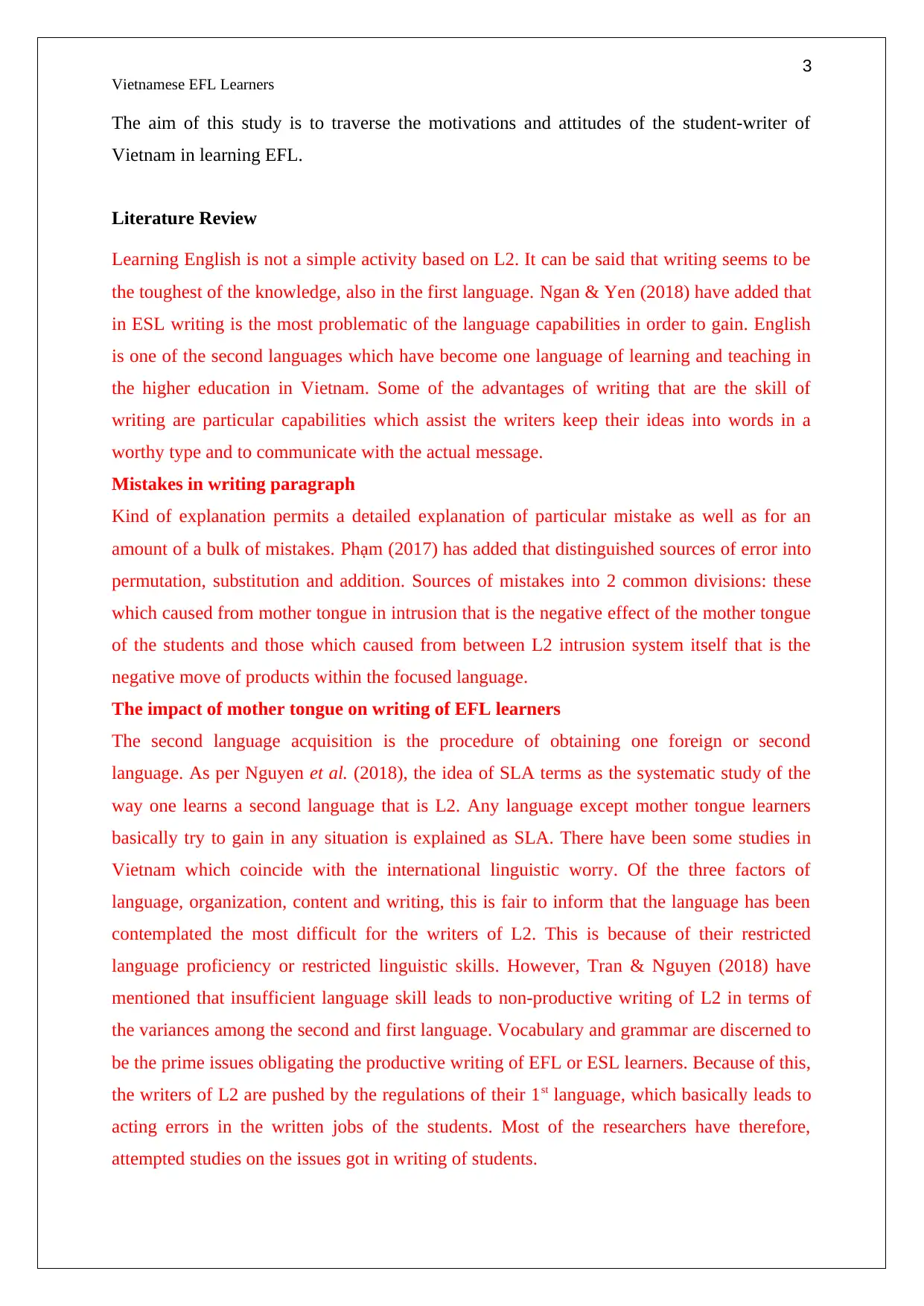
3
Vietnamese EFL Learners
The aim of this study is to traverse the motivations and attitudes of the student-writer of
Vietnam in learning EFL.
Literature Review
Learning English is not a simple activity based on L2. It can be said that writing seems to be
the toughest of the knowledge, also in the first language. Ngan & Yen (2018) have added that
in ESL writing is the most problematic of the language capabilities in order to gain. English
is one of the second languages which have become one language of learning and teaching in
the higher education in Vietnam. Some of the advantages of writing that are the skill of
writing are particular capabilities which assist the writers keep their ideas into words in a
worthy type and to communicate with the actual message.
Mistakes in writing paragraph
Kind of explanation permits a detailed explanation of particular mistake as well as for an
amount of a bulk of mistakes. Phạm (2017) has added that distinguished sources of error into
permutation, substitution and addition. Sources of mistakes into 2 common divisions: these
which caused from mother tongue in intrusion that is the negative effect of the mother tongue
of the students and those which caused from between L2 intrusion system itself that is the
negative move of products within the focused language.
The impact of mother tongue on writing of EFL learners
The second language acquisition is the procedure of obtaining one foreign or second
language. As per Nguyen et al. (2018), the idea of SLA terms as the systematic study of the
way one learns a second language that is L2. Any language except mother tongue learners
basically try to gain in any situation is explained as SLA. There have been some studies in
Vietnam which coincide with the international linguistic worry. Of the three factors of
language, organization, content and writing, this is fair to inform that the language has been
contemplated the most difficult for the writers of L2. This is because of their restricted
language proficiency or restricted linguistic skills. However, Tran & Nguyen (2018) have
mentioned that insufficient language skill leads to non-productive writing of L2 in terms of
the variances among the second and first language. Vocabulary and grammar are discerned to
be the prime issues obligating the productive writing of EFL or ESL learners. Because of this,
the writers of L2 are pushed by the regulations of their 1st language, which basically leads to
acting errors in the written jobs of the students. Most of the researchers have therefore,
attempted studies on the issues got in writing of students.
Vietnamese EFL Learners
The aim of this study is to traverse the motivations and attitudes of the student-writer of
Vietnam in learning EFL.
Literature Review
Learning English is not a simple activity based on L2. It can be said that writing seems to be
the toughest of the knowledge, also in the first language. Ngan & Yen (2018) have added that
in ESL writing is the most problematic of the language capabilities in order to gain. English
is one of the second languages which have become one language of learning and teaching in
the higher education in Vietnam. Some of the advantages of writing that are the skill of
writing are particular capabilities which assist the writers keep their ideas into words in a
worthy type and to communicate with the actual message.
Mistakes in writing paragraph
Kind of explanation permits a detailed explanation of particular mistake as well as for an
amount of a bulk of mistakes. Phạm (2017) has added that distinguished sources of error into
permutation, substitution and addition. Sources of mistakes into 2 common divisions: these
which caused from mother tongue in intrusion that is the negative effect of the mother tongue
of the students and those which caused from between L2 intrusion system itself that is the
negative move of products within the focused language.
The impact of mother tongue on writing of EFL learners
The second language acquisition is the procedure of obtaining one foreign or second
language. As per Nguyen et al. (2018), the idea of SLA terms as the systematic study of the
way one learns a second language that is L2. Any language except mother tongue learners
basically try to gain in any situation is explained as SLA. There have been some studies in
Vietnam which coincide with the international linguistic worry. Of the three factors of
language, organization, content and writing, this is fair to inform that the language has been
contemplated the most difficult for the writers of L2. This is because of their restricted
language proficiency or restricted linguistic skills. However, Tran & Nguyen (2018) have
mentioned that insufficient language skill leads to non-productive writing of L2 in terms of
the variances among the second and first language. Vocabulary and grammar are discerned to
be the prime issues obligating the productive writing of EFL or ESL learners. Because of this,
the writers of L2 are pushed by the regulations of their 1st language, which basically leads to
acting errors in the written jobs of the students. Most of the researchers have therefore,
attempted studies on the issues got in writing of students.
Secure Best Marks with AI Grader
Need help grading? Try our AI Grader for instant feedback on your assignments.
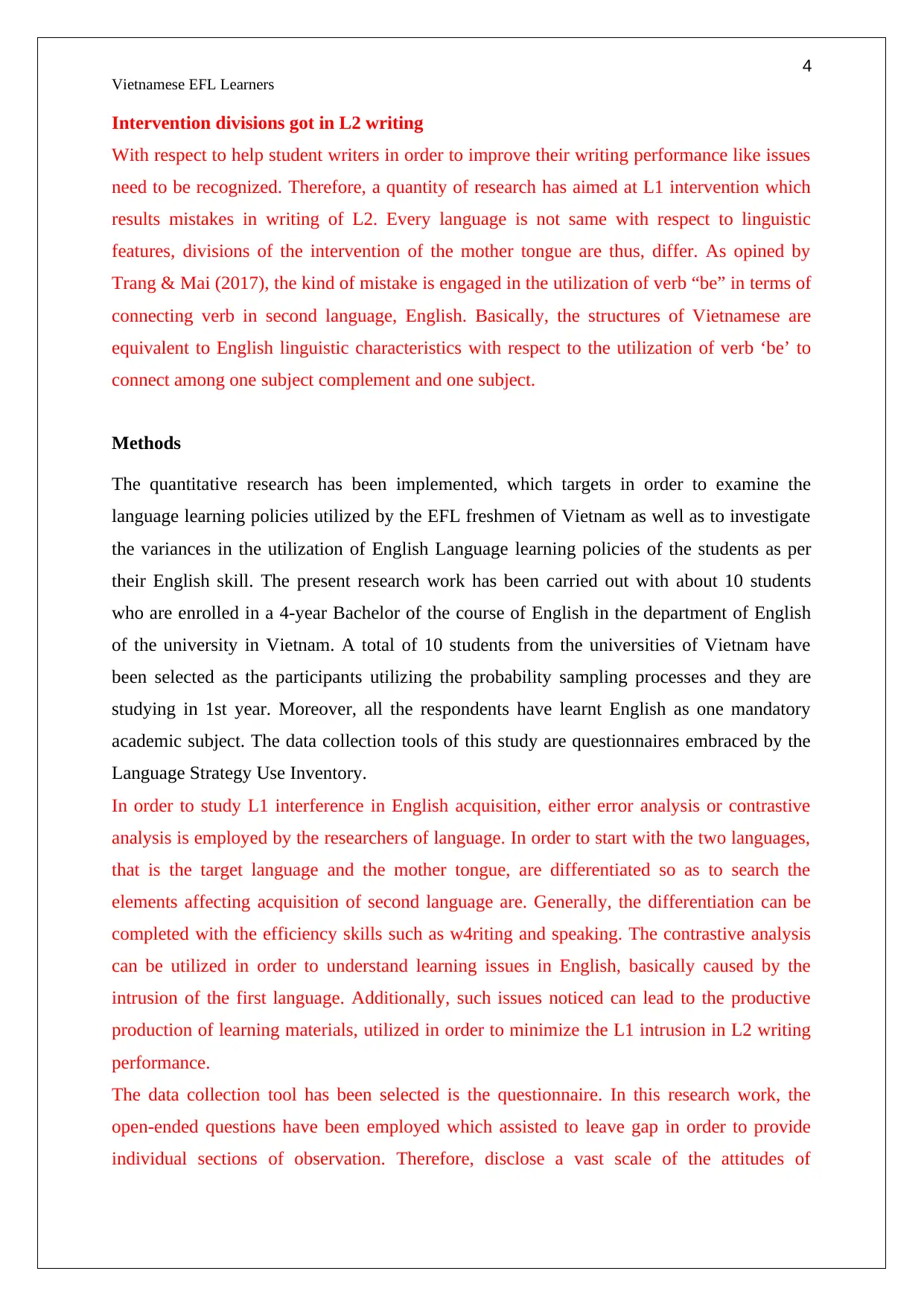
4
Vietnamese EFL Learners
Intervention divisions got in L2 writing
With respect to help student writers in order to improve their writing performance like issues
need to be recognized. Therefore, a quantity of research has aimed at L1 intervention which
results mistakes in writing of L2. Every language is not same with respect to linguistic
features, divisions of the intervention of the mother tongue are thus, differ. As opined by
Trang & Mai (2017), the kind of mistake is engaged in the utilization of verb “be” in terms of
connecting verb in second language, English. Basically, the structures of Vietnamese are
equivalent to English linguistic characteristics with respect to the utilization of verb ‘be’ to
connect among one subject complement and one subject.
Methods
The quantitative research has been implemented, which targets in order to examine the
language learning policies utilized by the EFL freshmen of Vietnam as well as to investigate
the variances in the utilization of English Language learning policies of the students as per
their English skill. The present research work has been carried out with about 10 students
who are enrolled in a 4-year Bachelor of the course of English in the department of English
of the university in Vietnam. A total of 10 students from the universities of Vietnam have
been selected as the participants utilizing the probability sampling processes and they are
studying in 1st year. Moreover, all the respondents have learnt English as one mandatory
academic subject. The data collection tools of this study are questionnaires embraced by the
Language Strategy Use Inventory.
In order to study L1 interference in English acquisition, either error analysis or contrastive
analysis is employed by the researchers of language. In order to start with the two languages,
that is the target language and the mother tongue, are differentiated so as to search the
elements affecting acquisition of second language are. Generally, the differentiation can be
completed with the efficiency skills such as w4riting and speaking. The contrastive analysis
can be utilized in order to understand learning issues in English, basically caused by the
intrusion of the first language. Additionally, such issues noticed can lead to the productive
production of learning materials, utilized in order to minimize the L1 intrusion in L2 writing
performance.
The data collection tool has been selected is the questionnaire. In this research work, the
open-ended questions have been employed which assisted to leave gap in order to provide
individual sections of observation. Therefore, disclose a vast scale of the attitudes of
Vietnamese EFL Learners
Intervention divisions got in L2 writing
With respect to help student writers in order to improve their writing performance like issues
need to be recognized. Therefore, a quantity of research has aimed at L1 intervention which
results mistakes in writing of L2. Every language is not same with respect to linguistic
features, divisions of the intervention of the mother tongue are thus, differ. As opined by
Trang & Mai (2017), the kind of mistake is engaged in the utilization of verb “be” in terms of
connecting verb in second language, English. Basically, the structures of Vietnamese are
equivalent to English linguistic characteristics with respect to the utilization of verb ‘be’ to
connect among one subject complement and one subject.
Methods
The quantitative research has been implemented, which targets in order to examine the
language learning policies utilized by the EFL freshmen of Vietnam as well as to investigate
the variances in the utilization of English Language learning policies of the students as per
their English skill. The present research work has been carried out with about 10 students
who are enrolled in a 4-year Bachelor of the course of English in the department of English
of the university in Vietnam. A total of 10 students from the universities of Vietnam have
been selected as the participants utilizing the probability sampling processes and they are
studying in 1st year. Moreover, all the respondents have learnt English as one mandatory
academic subject. The data collection tools of this study are questionnaires embraced by the
Language Strategy Use Inventory.
In order to study L1 interference in English acquisition, either error analysis or contrastive
analysis is employed by the researchers of language. In order to start with the two languages,
that is the target language and the mother tongue, are differentiated so as to search the
elements affecting acquisition of second language are. Generally, the differentiation can be
completed with the efficiency skills such as w4riting and speaking. The contrastive analysis
can be utilized in order to understand learning issues in English, basically caused by the
intrusion of the first language. Additionally, such issues noticed can lead to the productive
production of learning materials, utilized in order to minimize the L1 intrusion in L2 writing
performance.
The data collection tool has been selected is the questionnaire. In this research work, the
open-ended questions have been employed which assisted to leave gap in order to provide
individual sections of observation. Therefore, disclose a vast scale of the attitudes of
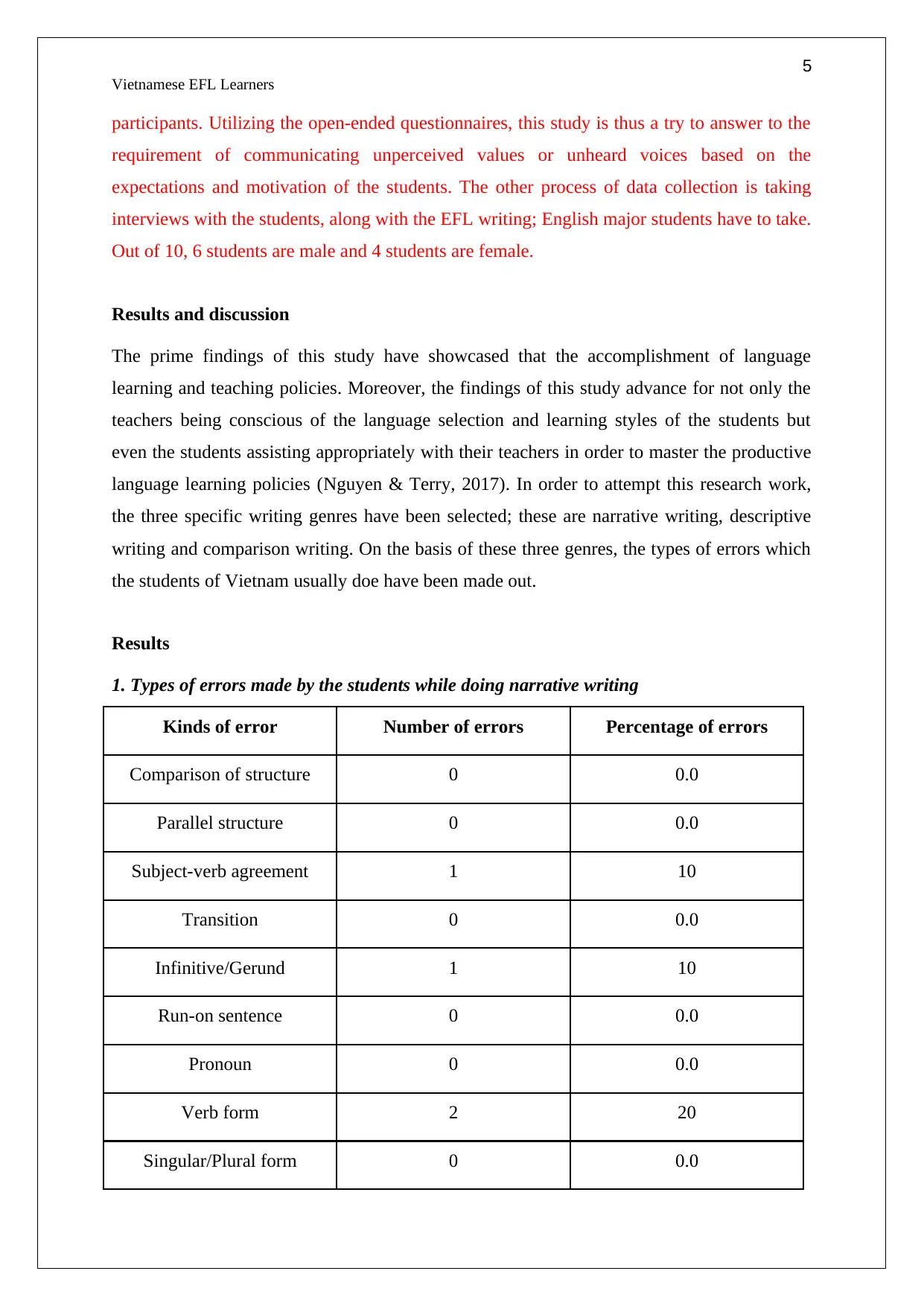
5
Vietnamese EFL Learners
participants. Utilizing the open-ended questionnaires, this study is thus a try to answer to the
requirement of communicating unperceived values or unheard voices based on the
expectations and motivation of the students. The other process of data collection is taking
interviews with the students, along with the EFL writing; English major students have to take.
Out of 10, 6 students are male and 4 students are female.
Results and discussion
The prime findings of this study have showcased that the accomplishment of language
learning and teaching policies. Moreover, the findings of this study advance for not only the
teachers being conscious of the language selection and learning styles of the students but
even the students assisting appropriately with their teachers in order to master the productive
language learning policies (Nguyen & Terry, 2017). In order to attempt this research work,
the three specific writing genres have been selected; these are narrative writing, descriptive
writing and comparison writing. On the basis of these three genres, the types of errors which
the students of Vietnam usually doe have been made out.
Results
1. Types of errors made by the students while doing narrative writing
Kinds of error Number of errors Percentage of errors
Comparison of structure 0 0.0
Parallel structure 0 0.0
Subject-verb agreement 1 10
Transition 0 0.0
Infinitive/Gerund 1 10
Run-on sentence 0 0.0
Pronoun 0 0.0
Verb form 2 20
Singular/Plural form 0 0.0
Vietnamese EFL Learners
participants. Utilizing the open-ended questionnaires, this study is thus a try to answer to the
requirement of communicating unperceived values or unheard voices based on the
expectations and motivation of the students. The other process of data collection is taking
interviews with the students, along with the EFL writing; English major students have to take.
Out of 10, 6 students are male and 4 students are female.
Results and discussion
The prime findings of this study have showcased that the accomplishment of language
learning and teaching policies. Moreover, the findings of this study advance for not only the
teachers being conscious of the language selection and learning styles of the students but
even the students assisting appropriately with their teachers in order to master the productive
language learning policies (Nguyen & Terry, 2017). In order to attempt this research work,
the three specific writing genres have been selected; these are narrative writing, descriptive
writing and comparison writing. On the basis of these three genres, the types of errors which
the students of Vietnam usually doe have been made out.
Results
1. Types of errors made by the students while doing narrative writing
Kinds of error Number of errors Percentage of errors
Comparison of structure 0 0.0
Parallel structure 0 0.0
Subject-verb agreement 1 10
Transition 0 0.0
Infinitive/Gerund 1 10
Run-on sentence 0 0.0
Pronoun 0 0.0
Verb form 2 20
Singular/Plural form 0 0.0
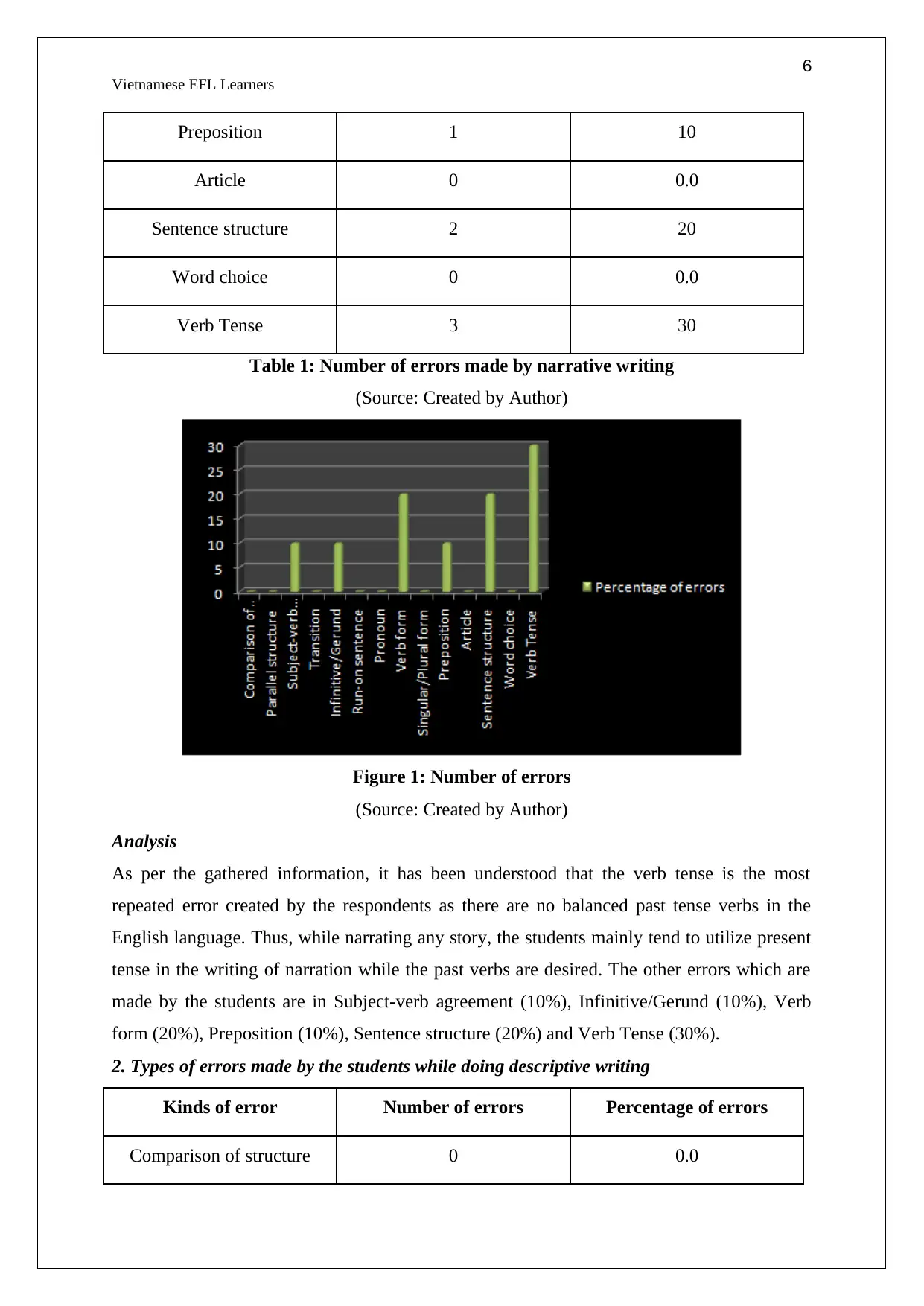
6
Vietnamese EFL Learners
Preposition 1 10
Article 0 0.0
Sentence structure 2 20
Word choice 0 0.0
Verb Tense 3 30
Table 1: Number of errors made by narrative writing
(Source: Created by Author)
Figure 1: Number of errors
(Source: Created by Author)
Analysis
As per the gathered information, it has been understood that the verb tense is the most
repeated error created by the respondents as there are no balanced past tense verbs in the
English language. Thus, while narrating any story, the students mainly tend to utilize present
tense in the writing of narration while the past verbs are desired. The other errors which are
made by the students are in Subject-verb agreement (10%), Infinitive/Gerund (10%), Verb
form (20%), Preposition (10%), Sentence structure (20%) and Verb Tense (30%).
2. Types of errors made by the students while doing descriptive writing
Kinds of error Number of errors Percentage of errors
Comparison of structure 0 0.0
Vietnamese EFL Learners
Preposition 1 10
Article 0 0.0
Sentence structure 2 20
Word choice 0 0.0
Verb Tense 3 30
Table 1: Number of errors made by narrative writing
(Source: Created by Author)
Figure 1: Number of errors
(Source: Created by Author)
Analysis
As per the gathered information, it has been understood that the verb tense is the most
repeated error created by the respondents as there are no balanced past tense verbs in the
English language. Thus, while narrating any story, the students mainly tend to utilize present
tense in the writing of narration while the past verbs are desired. The other errors which are
made by the students are in Subject-verb agreement (10%), Infinitive/Gerund (10%), Verb
form (20%), Preposition (10%), Sentence structure (20%) and Verb Tense (30%).
2. Types of errors made by the students while doing descriptive writing
Kinds of error Number of errors Percentage of errors
Comparison of structure 0 0.0
Paraphrase This Document
Need a fresh take? Get an instant paraphrase of this document with our AI Paraphraser
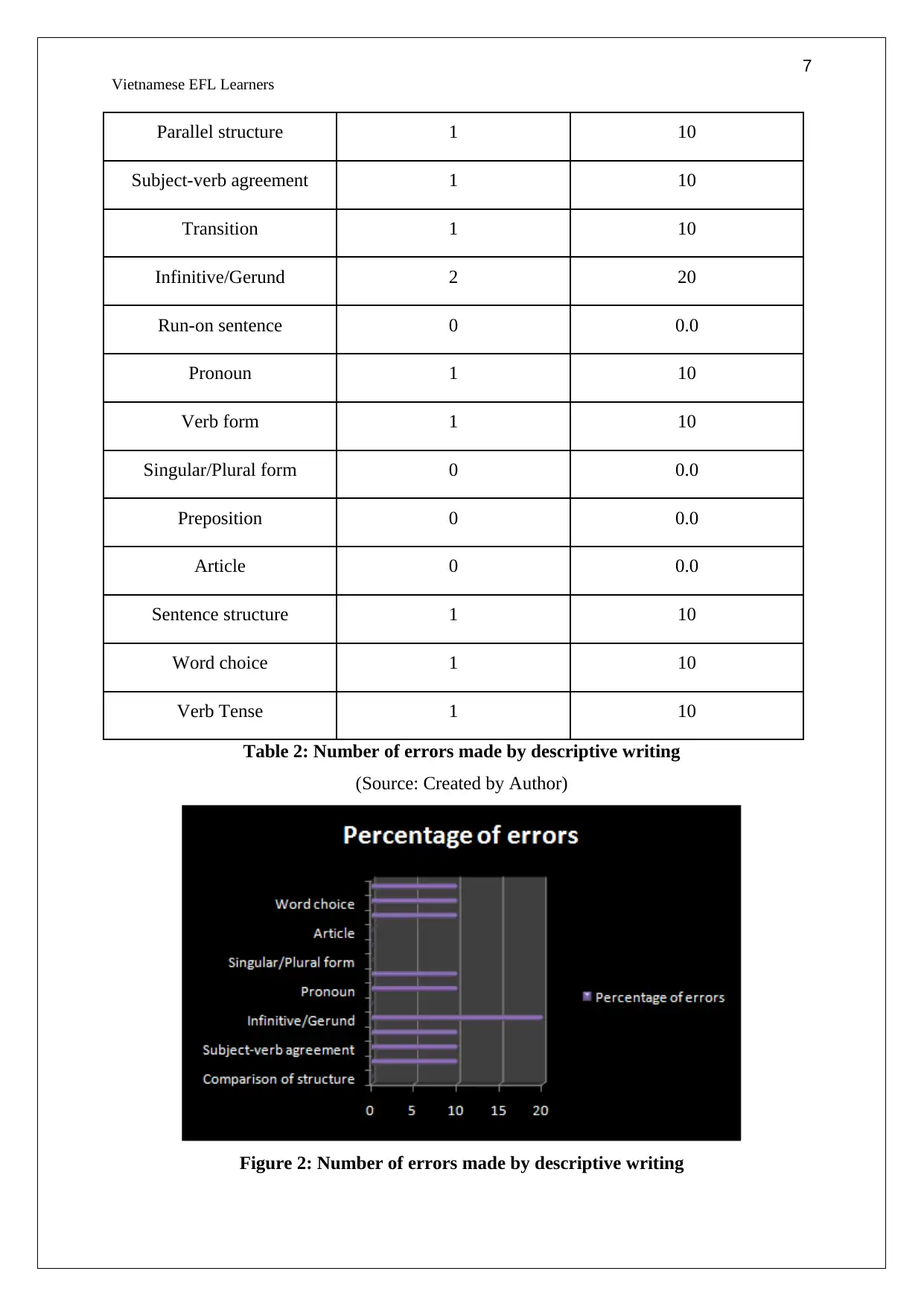
7
Vietnamese EFL Learners
Parallel structure 1 10
Subject-verb agreement 1 10
Transition 1 10
Infinitive/Gerund 2 20
Run-on sentence 0 0.0
Pronoun 1 10
Verb form 1 10
Singular/Plural form 0 0.0
Preposition 0 0.0
Article 0 0.0
Sentence structure 1 10
Word choice 1 10
Verb Tense 1 10
Table 2: Number of errors made by descriptive writing
(Source: Created by Author)
Figure 2: Number of errors made by descriptive writing
Vietnamese EFL Learners
Parallel structure 1 10
Subject-verb agreement 1 10
Transition 1 10
Infinitive/Gerund 2 20
Run-on sentence 0 0.0
Pronoun 1 10
Verb form 1 10
Singular/Plural form 0 0.0
Preposition 0 0.0
Article 0 0.0
Sentence structure 1 10
Word choice 1 10
Verb Tense 1 10
Table 2: Number of errors made by descriptive writing
(Source: Created by Author)
Figure 2: Number of errors made by descriptive writing
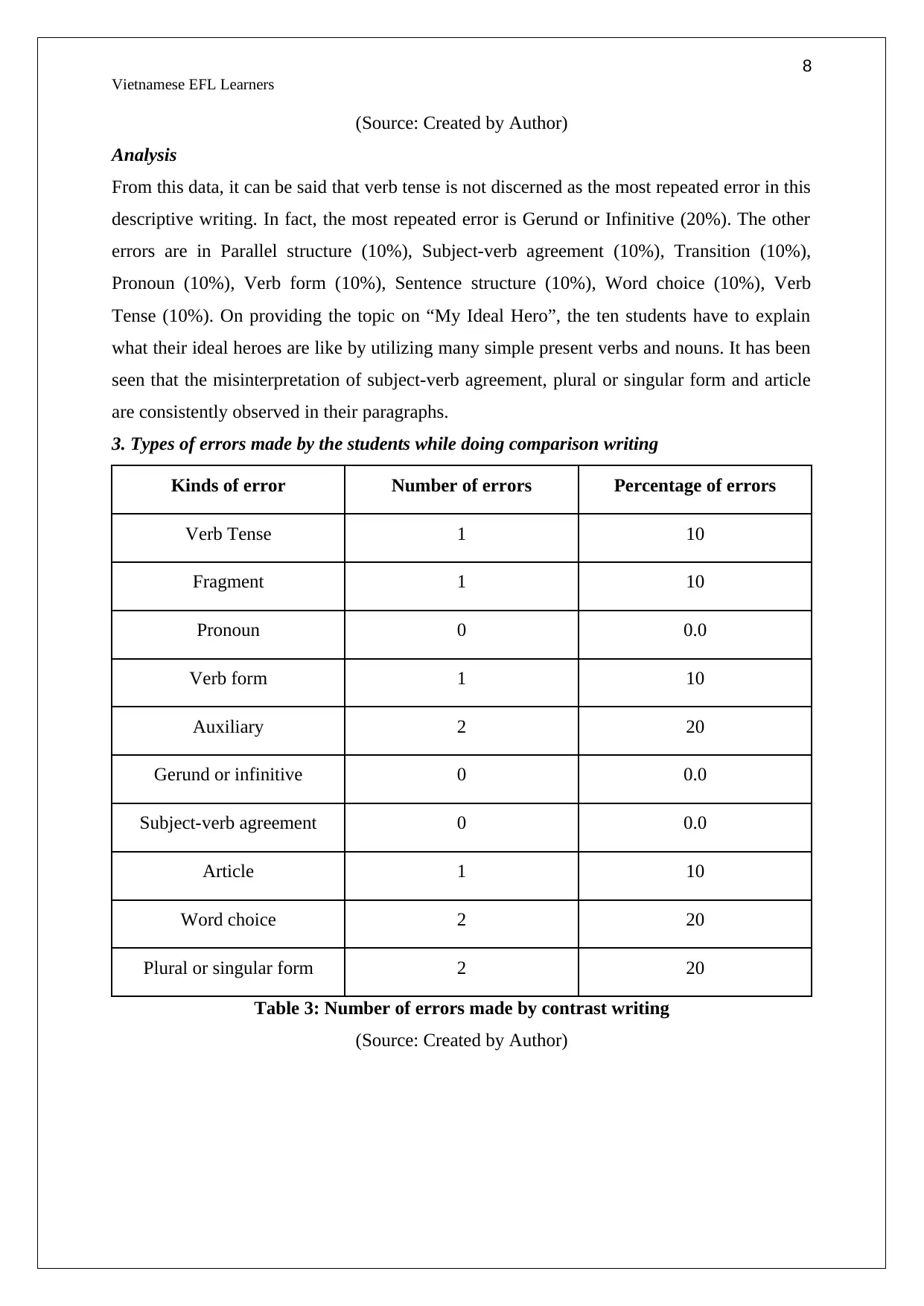
8
Vietnamese EFL Learners
(Source: Created by Author)
Analysis
From this data, it can be said that verb tense is not discerned as the most repeated error in this
descriptive writing. In fact, the most repeated error is Gerund or Infinitive (20%). The other
errors are in Parallel structure (10%), Subject-verb agreement (10%), Transition (10%),
Pronoun (10%), Verb form (10%), Sentence structure (10%), Word choice (10%), Verb
Tense (10%). On providing the topic on “My Ideal Hero”, the ten students have to explain
what their ideal heroes are like by utilizing many simple present verbs and nouns. It has been
seen that the misinterpretation of subject-verb agreement, plural or singular form and article
are consistently observed in their paragraphs.
3. Types of errors made by the students while doing comparison writing
Kinds of error Number of errors Percentage of errors
Verb Tense 1 10
Fragment 1 10
Pronoun 0 0.0
Verb form 1 10
Auxiliary 2 20
Gerund or infinitive 0 0.0
Subject-verb agreement 0 0.0
Article 1 10
Word choice 2 20
Plural or singular form 2 20
Table 3: Number of errors made by contrast writing
(Source: Created by Author)
Vietnamese EFL Learners
(Source: Created by Author)
Analysis
From this data, it can be said that verb tense is not discerned as the most repeated error in this
descriptive writing. In fact, the most repeated error is Gerund or Infinitive (20%). The other
errors are in Parallel structure (10%), Subject-verb agreement (10%), Transition (10%),
Pronoun (10%), Verb form (10%), Sentence structure (10%), Word choice (10%), Verb
Tense (10%). On providing the topic on “My Ideal Hero”, the ten students have to explain
what their ideal heroes are like by utilizing many simple present verbs and nouns. It has been
seen that the misinterpretation of subject-verb agreement, plural or singular form and article
are consistently observed in their paragraphs.
3. Types of errors made by the students while doing comparison writing
Kinds of error Number of errors Percentage of errors
Verb Tense 1 10
Fragment 1 10
Pronoun 0 0.0
Verb form 1 10
Auxiliary 2 20
Gerund or infinitive 0 0.0
Subject-verb agreement 0 0.0
Article 1 10
Word choice 2 20
Plural or singular form 2 20
Table 3: Number of errors made by contrast writing
(Source: Created by Author)
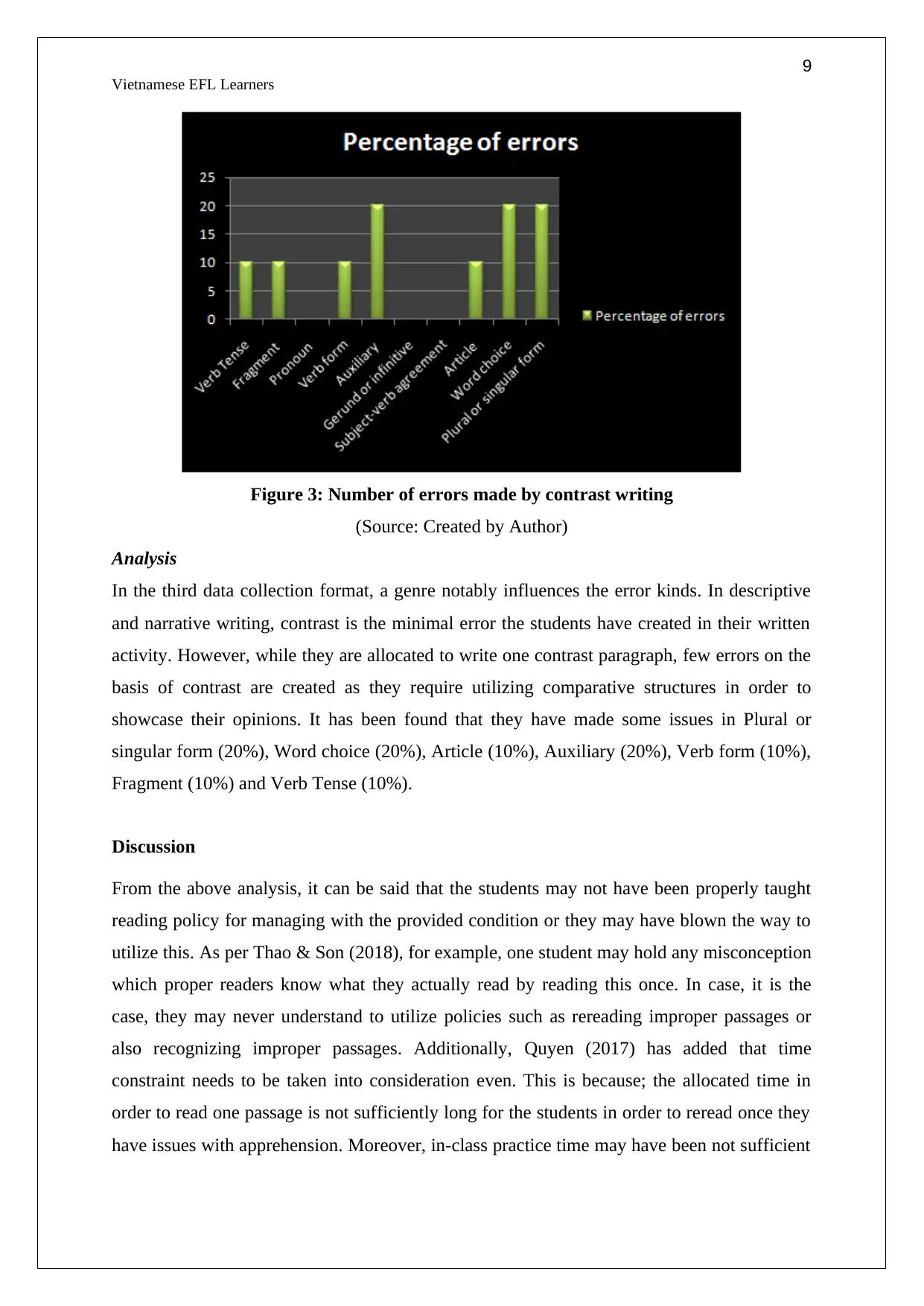
9
Vietnamese EFL Learners
Figure 3: Number of errors made by contrast writing
(Source: Created by Author)
Analysis
In the third data collection format, a genre notably influences the error kinds. In descriptive
and narrative writing, contrast is the minimal error the students have created in their written
activity. However, while they are allocated to write one contrast paragraph, few errors on the
basis of contrast are created as they require utilizing comparative structures in order to
showcase their opinions. It has been found that they have made some issues in Plural or
singular form (20%), Word choice (20%), Article (10%), Auxiliary (20%), Verb form (10%),
Fragment (10%) and Verb Tense (10%).
Discussion
From the above analysis, it can be said that the students may not have been properly taught
reading policy for managing with the provided condition or they may have blown the way to
utilize this. As per Thao & Son (2018), for example, one student may hold any misconception
which proper readers know what they actually read by reading this once. In case, it is the
case, they may never understand to utilize policies such as rereading improper passages or
also recognizing improper passages. Additionally, Quyen (2017) has added that time
constraint needs to be taken into consideration even. This is because; the allocated time in
order to read one passage is not sufficiently long for the students in order to reread once they
have issues with apprehension. Moreover, in-class practice time may have been not sufficient
Vietnamese EFL Learners
Figure 3: Number of errors made by contrast writing
(Source: Created by Author)
Analysis
In the third data collection format, a genre notably influences the error kinds. In descriptive
and narrative writing, contrast is the minimal error the students have created in their written
activity. However, while they are allocated to write one contrast paragraph, few errors on the
basis of contrast are created as they require utilizing comparative structures in order to
showcase their opinions. It has been found that they have made some issues in Plural or
singular form (20%), Word choice (20%), Article (10%), Auxiliary (20%), Verb form (10%),
Fragment (10%) and Verb Tense (10%).
Discussion
From the above analysis, it can be said that the students may not have been properly taught
reading policy for managing with the provided condition or they may have blown the way to
utilize this. As per Thao & Son (2018), for example, one student may hold any misconception
which proper readers know what they actually read by reading this once. In case, it is the
case, they may never understand to utilize policies such as rereading improper passages or
also recognizing improper passages. Additionally, Quyen (2017) has added that time
constraint needs to be taken into consideration even. This is because; the allocated time in
order to read one passage is not sufficiently long for the students in order to reread once they
have issues with apprehension. Moreover, in-class practice time may have been not sufficient
Secure Best Marks with AI Grader
Need help grading? Try our AI Grader for instant feedback on your assignments.
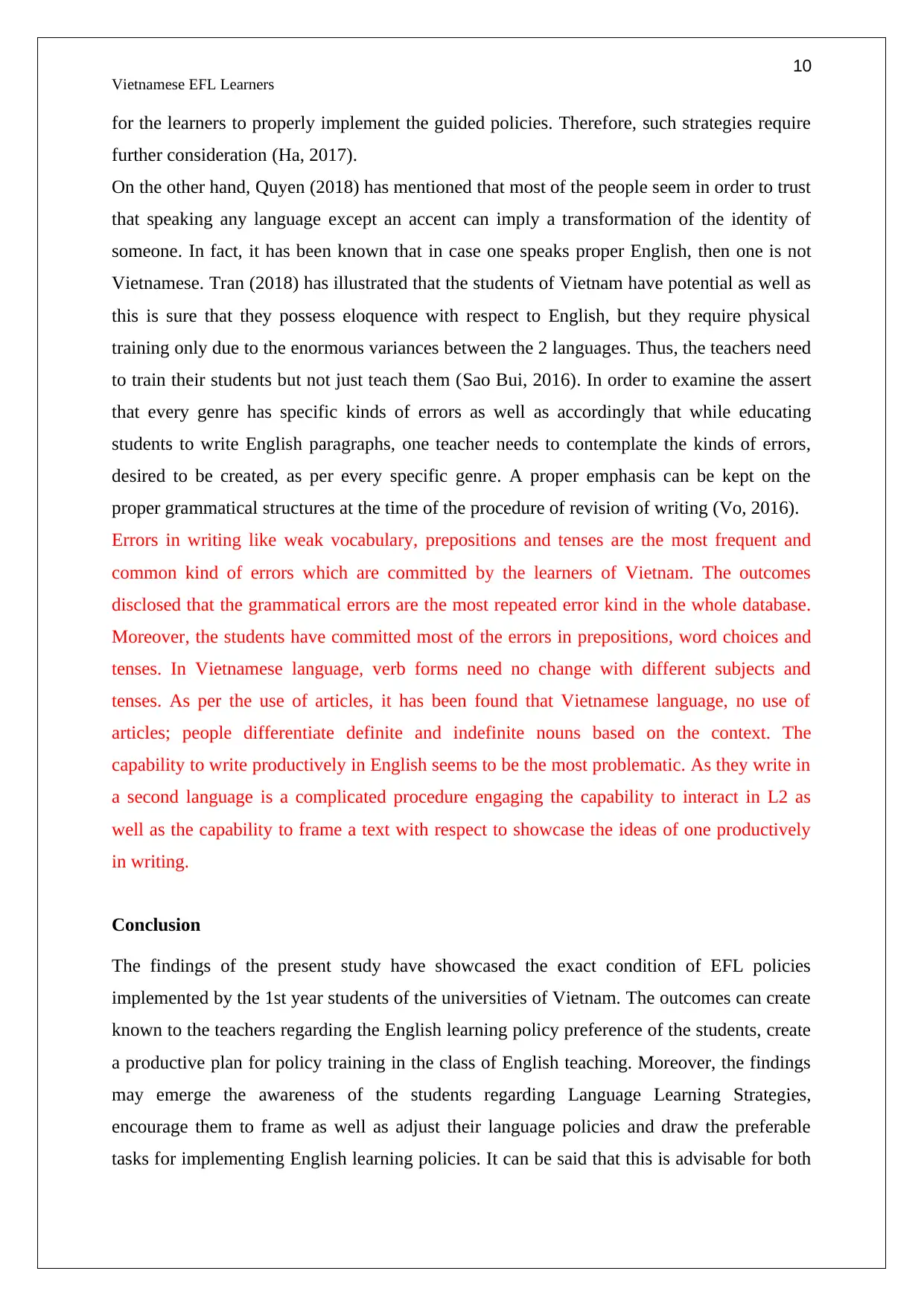
10
Vietnamese EFL Learners
for the learners to properly implement the guided policies. Therefore, such strategies require
further consideration (Ha, 2017).
On the other hand, Quyen (2018) has mentioned that most of the people seem in order to trust
that speaking any language except an accent can imply a transformation of the identity of
someone. In fact, it has been known that in case one speaks proper English, then one is not
Vietnamese. Tran (2018) has illustrated that the students of Vietnam have potential as well as
this is sure that they possess eloquence with respect to English, but they require physical
training only due to the enormous variances between the 2 languages. Thus, the teachers need
to train their students but not just teach them (Sao Bui, 2016). In order to examine the assert
that every genre has specific kinds of errors as well as accordingly that while educating
students to write English paragraphs, one teacher needs to contemplate the kinds of errors,
desired to be created, as per every specific genre. A proper emphasis can be kept on the
proper grammatical structures at the time of the procedure of revision of writing (Vo, 2016).
Errors in writing like weak vocabulary, prepositions and tenses are the most frequent and
common kind of errors which are committed by the learners of Vietnam. The outcomes
disclosed that the grammatical errors are the most repeated error kind in the whole database.
Moreover, the students have committed most of the errors in prepositions, word choices and
tenses. In Vietnamese language, verb forms need no change with different subjects and
tenses. As per the use of articles, it has been found that Vietnamese language, no use of
articles; people differentiate definite and indefinite nouns based on the context. The
capability to write productively in English seems to be the most problematic. As they write in
a second language is a complicated procedure engaging the capability to interact in L2 as
well as the capability to frame a text with respect to showcase the ideas of one productively
in writing.
Conclusion
The findings of the present study have showcased the exact condition of EFL policies
implemented by the 1st year students of the universities of Vietnam. The outcomes can create
known to the teachers regarding the English learning policy preference of the students, create
a productive plan for policy training in the class of English teaching. Moreover, the findings
may emerge the awareness of the students regarding Language Learning Strategies,
encourage them to frame as well as adjust their language policies and draw the preferable
tasks for implementing English learning policies. It can be said that this is advisable for both
Vietnamese EFL Learners
for the learners to properly implement the guided policies. Therefore, such strategies require
further consideration (Ha, 2017).
On the other hand, Quyen (2018) has mentioned that most of the people seem in order to trust
that speaking any language except an accent can imply a transformation of the identity of
someone. In fact, it has been known that in case one speaks proper English, then one is not
Vietnamese. Tran (2018) has illustrated that the students of Vietnam have potential as well as
this is sure that they possess eloquence with respect to English, but they require physical
training only due to the enormous variances between the 2 languages. Thus, the teachers need
to train their students but not just teach them (Sao Bui, 2016). In order to examine the assert
that every genre has specific kinds of errors as well as accordingly that while educating
students to write English paragraphs, one teacher needs to contemplate the kinds of errors,
desired to be created, as per every specific genre. A proper emphasis can be kept on the
proper grammatical structures at the time of the procedure of revision of writing (Vo, 2016).
Errors in writing like weak vocabulary, prepositions and tenses are the most frequent and
common kind of errors which are committed by the learners of Vietnam. The outcomes
disclosed that the grammatical errors are the most repeated error kind in the whole database.
Moreover, the students have committed most of the errors in prepositions, word choices and
tenses. In Vietnamese language, verb forms need no change with different subjects and
tenses. As per the use of articles, it has been found that Vietnamese language, no use of
articles; people differentiate definite and indefinite nouns based on the context. The
capability to write productively in English seems to be the most problematic. As they write in
a second language is a complicated procedure engaging the capability to interact in L2 as
well as the capability to frame a text with respect to showcase the ideas of one productively
in writing.
Conclusion
The findings of the present study have showcased the exact condition of EFL policies
implemented by the 1st year students of the universities of Vietnam. The outcomes can create
known to the teachers regarding the English learning policy preference of the students, create
a productive plan for policy training in the class of English teaching. Moreover, the findings
may emerge the awareness of the students regarding Language Learning Strategies,
encourage them to frame as well as adjust their language policies and draw the preferable
tasks for implementing English learning policies. It can be said that this is advisable for both
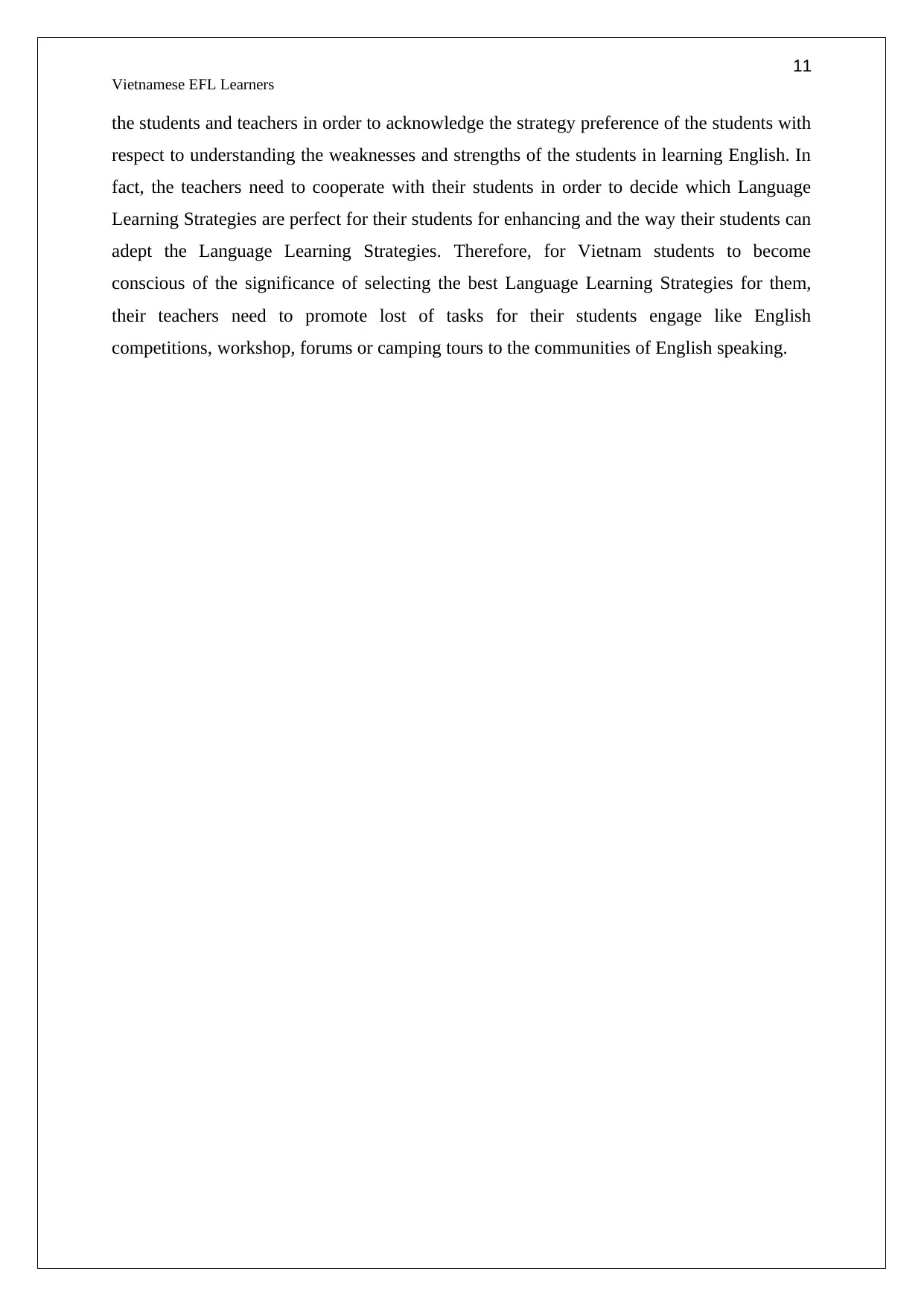
11
Vietnamese EFL Learners
the students and teachers in order to acknowledge the strategy preference of the students with
respect to understanding the weaknesses and strengths of the students in learning English. In
fact, the teachers need to cooperate with their students in order to decide which Language
Learning Strategies are perfect for their students for enhancing and the way their students can
adept the Language Learning Strategies. Therefore, for Vietnam students to become
conscious of the significance of selecting the best Language Learning Strategies for them,
their teachers need to promote lost of tasks for their students engage like English
competitions, workshop, forums or camping tours to the communities of English speaking.
Vietnamese EFL Learners
the students and teachers in order to acknowledge the strategy preference of the students with
respect to understanding the weaknesses and strengths of the students in learning English. In
fact, the teachers need to cooperate with their students in order to decide which Language
Learning Strategies are perfect for their students for enhancing and the way their students can
adept the Language Learning Strategies. Therefore, for Vietnam students to become
conscious of the significance of selecting the best Language Learning Strategies for them,
their teachers need to promote lost of tasks for their students engage like English
competitions, workshop, forums or camping tours to the communities of English speaking.
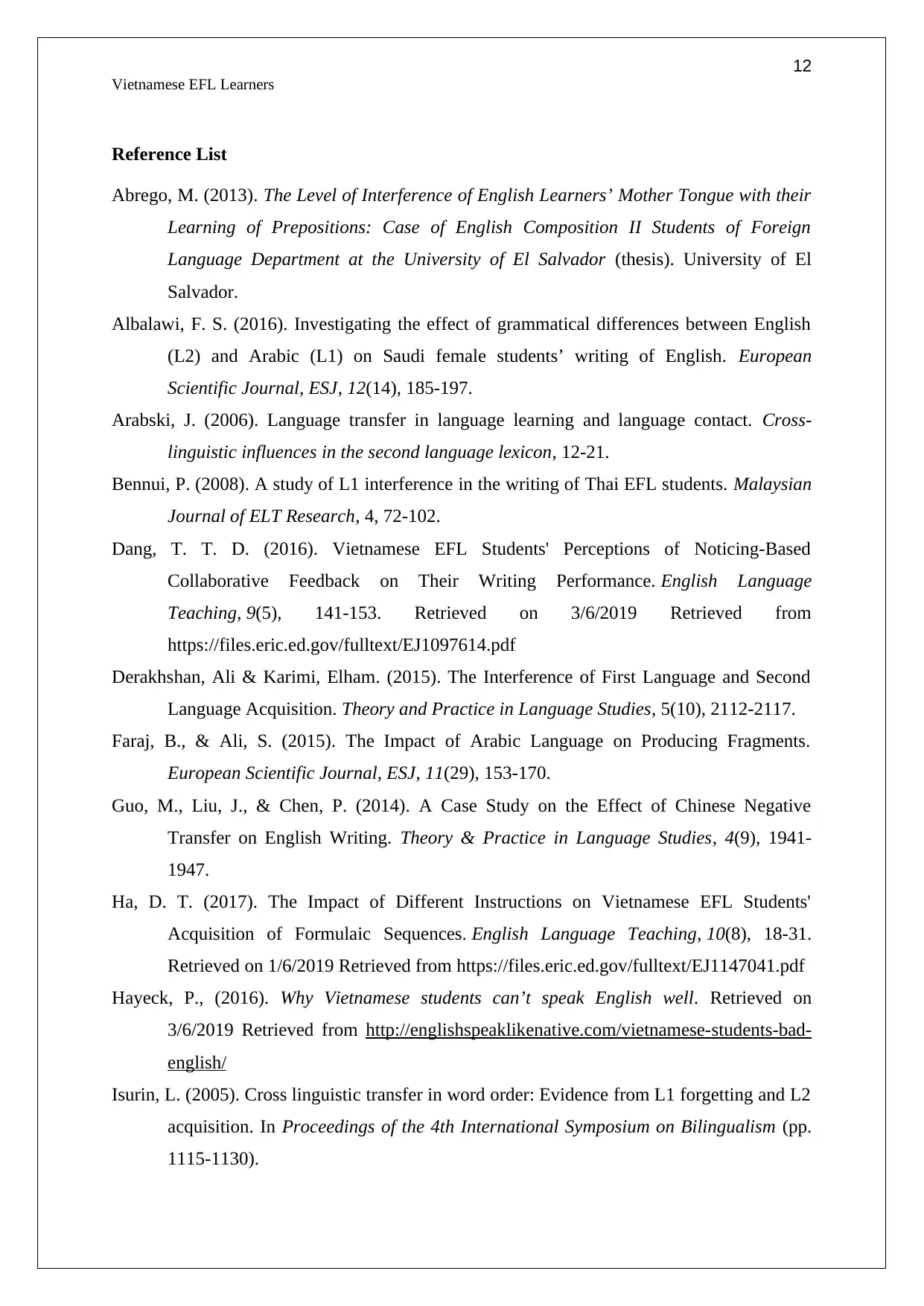
12
Vietnamese EFL Learners
Reference List
Abrego, M. (2013). The Level of Interference of English Learners’ Mother Tongue with their
Learning of Prepositions: Case of English Composition II Students of Foreign
Language Department at the University of El Salvador (thesis). University of El
Salvador.
Albalawi, F. S. (2016). Investigating the effect of grammatical differences between English
(L2) and Arabic (L1) on Saudi female students’ writing of English. European
Scientific Journal, ESJ, 12(14), 185-197.
Arabski, J. (2006). Language transfer in language learning and language contact. Cross-
linguistic influences in the second language lexicon, 12-21.
Bennui, P. (2008). A study of L1 interference in the writing of Thai EFL students. Malaysian
Journal of ELT Research, 4, 72-102.
Dang, T. T. D. (2016). Vietnamese EFL Students' Perceptions of Noticing-Based
Collaborative Feedback on Their Writing Performance. English Language
Teaching, 9(5), 141-153. Retrieved on 3/6/2019 Retrieved from
https://files.eric.ed.gov/fulltext/EJ1097614.pdf
Derakhshan, Ali & Karimi, Elham. (2015). The Interference of First Language and Second
Language Acquisition. Theory and Practice in Language Studies, 5(10), 2112-2117.
Faraj, B., & Ali, S. (2015). The Impact of Arabic Language on Producing Fragments.
European Scientific Journal, ESJ, 11(29), 153-170.
Guo, M., Liu, J., & Chen, P. (2014). A Case Study on the Effect of Chinese Negative
Transfer on English Writing. Theory & Practice in Language Studies, 4(9), 1941-
1947.
Ha, D. T. (2017). The Impact of Different Instructions on Vietnamese EFL Students'
Acquisition of Formulaic Sequences. English Language Teaching, 10(8), 18-31.
Retrieved on 1/6/2019 Retrieved from https://files.eric.ed.gov/fulltext/EJ1147041.pdf
Hayeck, P., (2016). Why Vietnamese students can’t speak English well. Retrieved on
3/6/2019 Retrieved from http://englishspeaklikenative.com/vietnamese-students-bad-
english/
Isurin, L. (2005). Cross linguistic transfer in word order: Evidence from L1 forgetting and L2
acquisition. In Proceedings of the 4th International Symposium on Bilingualism (pp.
1115-1130).
Vietnamese EFL Learners
Reference List
Abrego, M. (2013). The Level of Interference of English Learners’ Mother Tongue with their
Learning of Prepositions: Case of English Composition II Students of Foreign
Language Department at the University of El Salvador (thesis). University of El
Salvador.
Albalawi, F. S. (2016). Investigating the effect of grammatical differences between English
(L2) and Arabic (L1) on Saudi female students’ writing of English. European
Scientific Journal, ESJ, 12(14), 185-197.
Arabski, J. (2006). Language transfer in language learning and language contact. Cross-
linguistic influences in the second language lexicon, 12-21.
Bennui, P. (2008). A study of L1 interference in the writing of Thai EFL students. Malaysian
Journal of ELT Research, 4, 72-102.
Dang, T. T. D. (2016). Vietnamese EFL Students' Perceptions of Noticing-Based
Collaborative Feedback on Their Writing Performance. English Language
Teaching, 9(5), 141-153. Retrieved on 3/6/2019 Retrieved from
https://files.eric.ed.gov/fulltext/EJ1097614.pdf
Derakhshan, Ali & Karimi, Elham. (2015). The Interference of First Language and Second
Language Acquisition. Theory and Practice in Language Studies, 5(10), 2112-2117.
Faraj, B., & Ali, S. (2015). The Impact of Arabic Language on Producing Fragments.
European Scientific Journal, ESJ, 11(29), 153-170.
Guo, M., Liu, J., & Chen, P. (2014). A Case Study on the Effect of Chinese Negative
Transfer on English Writing. Theory & Practice in Language Studies, 4(9), 1941-
1947.
Ha, D. T. (2017). The Impact of Different Instructions on Vietnamese EFL Students'
Acquisition of Formulaic Sequences. English Language Teaching, 10(8), 18-31.
Retrieved on 1/6/2019 Retrieved from https://files.eric.ed.gov/fulltext/EJ1147041.pdf
Hayeck, P., (2016). Why Vietnamese students can’t speak English well. Retrieved on
3/6/2019 Retrieved from http://englishspeaklikenative.com/vietnamese-students-bad-
english/
Isurin, L. (2005). Cross linguistic transfer in word order: Evidence from L1 forgetting and L2
acquisition. In Proceedings of the 4th International Symposium on Bilingualism (pp.
1115-1130).
Paraphrase This Document
Need a fresh take? Get an instant paraphrase of this document with our AI Paraphraser
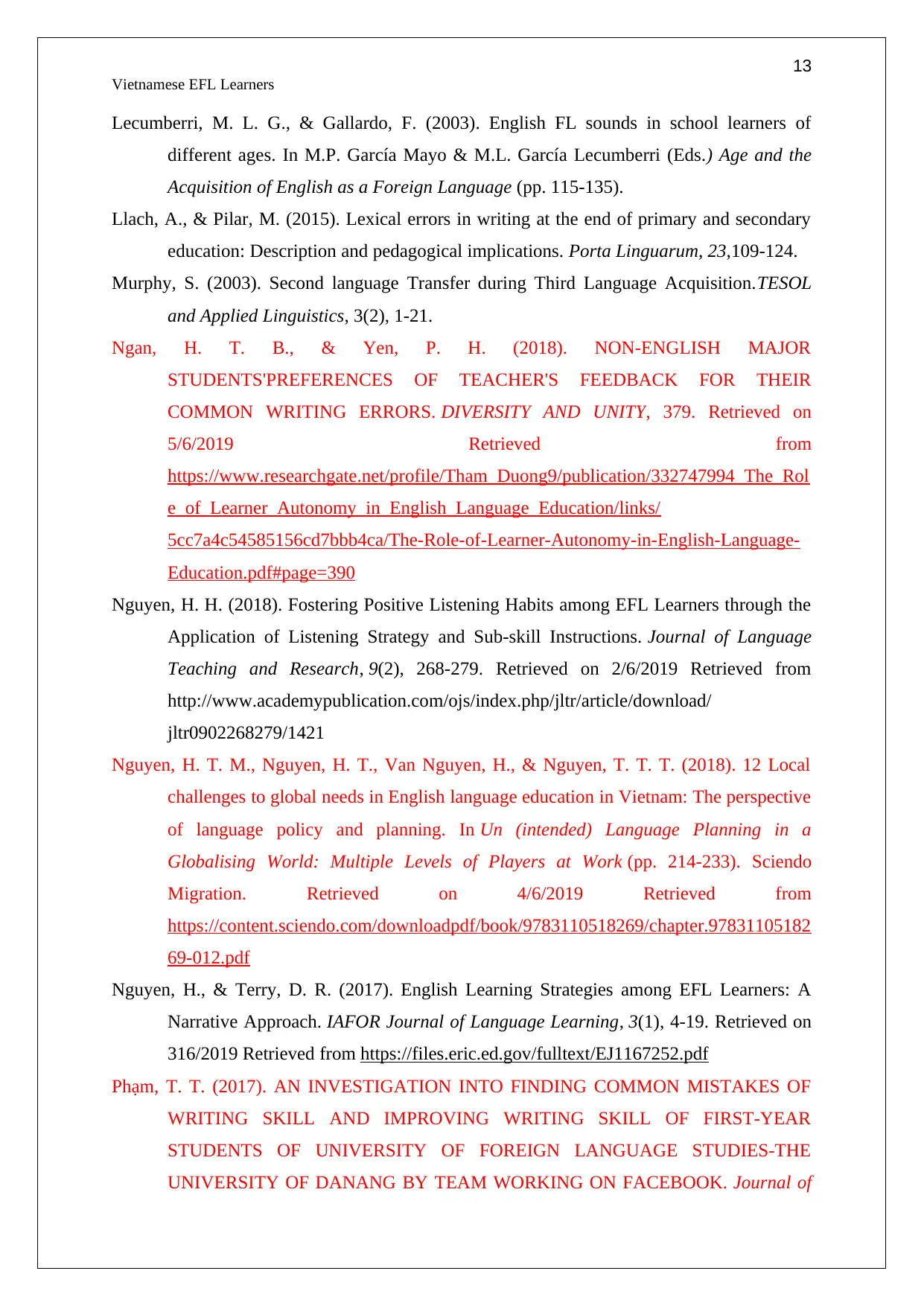
13
Vietnamese EFL Learners
Lecumberri, M. L. G., & Gallardo, F. (2003). English FL sounds in school learners of
different ages. In M.P. García Mayo & M.L. García Lecumberri (Eds.) Age and the
Acquisition of English as a Foreign Language (pp. 115-135).
Llach, A., & Pilar, M. (2015). Lexical errors in writing at the end of primary and secondary
education: Description and pedagogical implications. Porta Linguarum, 23,109-124.
Murphy, S. (2003). Second language Transfer during Third Language Acquisition.TESOL
and Applied Linguistics, 3(2), 1-21.
Ngan, H. T. B., & Yen, P. H. (2018). NON-ENGLISH MAJOR
STUDENTS'PREFERENCES OF TEACHER'S FEEDBACK FOR THEIR
COMMON WRITING ERRORS. DIVERSITY AND UNITY, 379. Retrieved on
5/6/2019 Retrieved from
https://www.researchgate.net/profile/Tham_Duong9/publication/332747994_The_Rol
e_of_Learner_Autonomy_in_English_Language_Education/links/
5cc7a4c54585156cd7bbb4ca/The-Role-of-Learner-Autonomy-in-English-Language-
Education.pdf#page=390
Nguyen, H. H. (2018). Fostering Positive Listening Habits among EFL Learners through the
Application of Listening Strategy and Sub-skill Instructions. Journal of Language
Teaching and Research, 9(2), 268-279. Retrieved on 2/6/2019 Retrieved from
http://www.academypublication.com/ojs/index.php/jltr/article/download/
jltr0902268279/1421
Nguyen, H. T. M., Nguyen, H. T., Van Nguyen, H., & Nguyen, T. T. T. (2018). 12 Local
challenges to global needs in English language education in Vietnam: The perspective
of language policy and planning. In Un (intended) Language Planning in a
Globalising World: Multiple Levels of Players at Work (pp. 214-233). Sciendo
Migration. Retrieved on 4/6/2019 Retrieved from
https://content.sciendo.com/downloadpdf/book/9783110518269/chapter.97831105182
69-012.pdf
Nguyen, H., & Terry, D. R. (2017). English Learning Strategies among EFL Learners: A
Narrative Approach. IAFOR Journal of Language Learning, 3(1), 4-19. Retrieved on
316/2019 Retrieved from https://files.eric.ed.gov/fulltext/EJ1167252.pdf
Phạm, T. T. (2017). AN INVESTIGATION INTO FINDING COMMON MISTAKES OF
WRITING SKILL AND IMPROVING WRITING SKILL OF FIRST-YEAR
STUDENTS OF UNIVERSITY OF FOREIGN LANGUAGE STUDIES-THE
UNIVERSITY OF DANANG BY TEAM WORKING ON FACEBOOK. Journal of
Vietnamese EFL Learners
Lecumberri, M. L. G., & Gallardo, F. (2003). English FL sounds in school learners of
different ages. In M.P. García Mayo & M.L. García Lecumberri (Eds.) Age and the
Acquisition of English as a Foreign Language (pp. 115-135).
Llach, A., & Pilar, M. (2015). Lexical errors in writing at the end of primary and secondary
education: Description and pedagogical implications. Porta Linguarum, 23,109-124.
Murphy, S. (2003). Second language Transfer during Third Language Acquisition.TESOL
and Applied Linguistics, 3(2), 1-21.
Ngan, H. T. B., & Yen, P. H. (2018). NON-ENGLISH MAJOR
STUDENTS'PREFERENCES OF TEACHER'S FEEDBACK FOR THEIR
COMMON WRITING ERRORS. DIVERSITY AND UNITY, 379. Retrieved on
5/6/2019 Retrieved from
https://www.researchgate.net/profile/Tham_Duong9/publication/332747994_The_Rol
e_of_Learner_Autonomy_in_English_Language_Education/links/
5cc7a4c54585156cd7bbb4ca/The-Role-of-Learner-Autonomy-in-English-Language-
Education.pdf#page=390
Nguyen, H. H. (2018). Fostering Positive Listening Habits among EFL Learners through the
Application of Listening Strategy and Sub-skill Instructions. Journal of Language
Teaching and Research, 9(2), 268-279. Retrieved on 2/6/2019 Retrieved from
http://www.academypublication.com/ojs/index.php/jltr/article/download/
jltr0902268279/1421
Nguyen, H. T. M., Nguyen, H. T., Van Nguyen, H., & Nguyen, T. T. T. (2018). 12 Local
challenges to global needs in English language education in Vietnam: The perspective
of language policy and planning. In Un (intended) Language Planning in a
Globalising World: Multiple Levels of Players at Work (pp. 214-233). Sciendo
Migration. Retrieved on 4/6/2019 Retrieved from
https://content.sciendo.com/downloadpdf/book/9783110518269/chapter.97831105182
69-012.pdf
Nguyen, H., & Terry, D. R. (2017). English Learning Strategies among EFL Learners: A
Narrative Approach. IAFOR Journal of Language Learning, 3(1), 4-19. Retrieved on
316/2019 Retrieved from https://files.eric.ed.gov/fulltext/EJ1167252.pdf
Phạm, T. T. (2017). AN INVESTIGATION INTO FINDING COMMON MISTAKES OF
WRITING SKILL AND IMPROVING WRITING SKILL OF FIRST-YEAR
STUDENTS OF UNIVERSITY OF FOREIGN LANGUAGE STUDIES-THE
UNIVERSITY OF DANANG BY TEAM WORKING ON FACEBOOK. Journal of
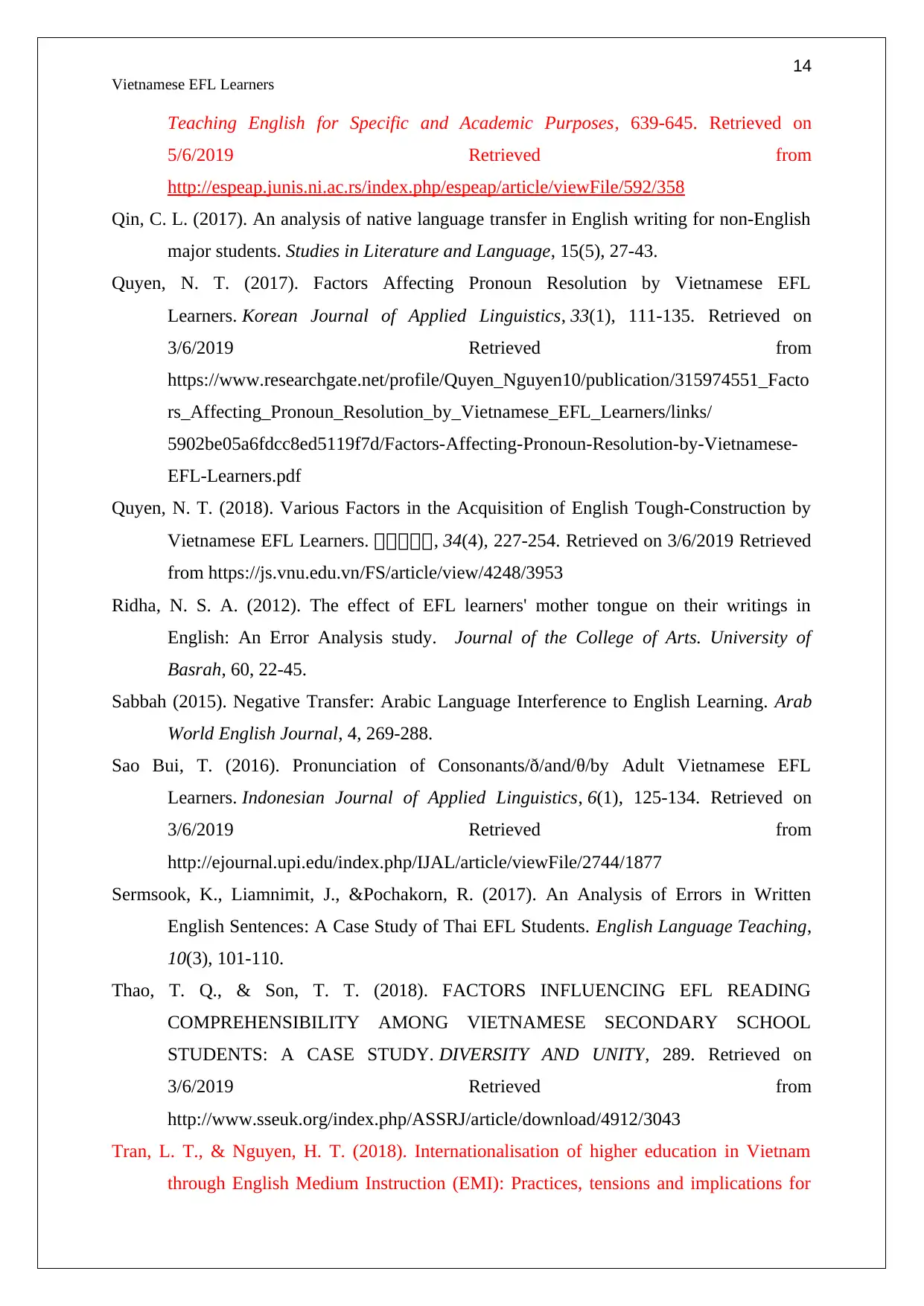
14
Vietnamese EFL Learners
Teaching English for Specific and Academic Purposes, 639-645. Retrieved on
5/6/2019 Retrieved from
http://espeap.junis.ni.ac.rs/index.php/espeap/article/viewFile/592/358
Qin, C. L. (2017). An analysis of native language transfer in English writing for non-English
major students. Studies in Literature and Language, 15(5), 27-43.
Quyen, N. T. (2017). Factors Affecting Pronoun Resolution by Vietnamese EFL
Learners. Korean Journal of Applied Linguistics, 33(1), 111-135. Retrieved on
3/6/2019 Retrieved from
https://www.researchgate.net/profile/Quyen_Nguyen10/publication/315974551_Facto
rs_Affecting_Pronoun_Resolution_by_Vietnamese_EFL_Learners/links/
5902be05a6fdcc8ed5119f7d/Factors-Affecting-Pronoun-Resolution-by-Vietnamese-
EFL-Learners.pdf
Quyen, N. T. (2018). Various Factors in the Acquisition of English Tough-Construction by
Vietnamese EFL Learners. 응응응응응, 34(4), 227-254. Retrieved on 3/6/2019 Retrieved
from https://js.vnu.edu.vn/FS/article/view/4248/3953
Ridha, N. S. A. (2012). The effect of EFL learners' mother tongue on their writings in
English: An Error Analysis study. Journal of the College of Arts. University of
Basrah, 60, 22-45.
Sabbah (2015). Negative Transfer: Arabic Language Interference to English Learning. Arab
World English Journal, 4, 269-288.
Sao Bui, T. (2016). Pronunciation of Consonants/ð/and/θ/by Adult Vietnamese EFL
Learners. Indonesian Journal of Applied Linguistics, 6(1), 125-134. Retrieved on
3/6/2019 Retrieved from
http://ejournal.upi.edu/index.php/IJAL/article/viewFile/2744/1877
Sermsook, K., Liamnimit, J., &Pochakorn, R. (2017). An Analysis of Errors in Written
English Sentences: A Case Study of Thai EFL Students. English Language Teaching,
10(3), 101-110.
Thao, T. Q., & Son, T. T. (2018). FACTORS INFLUENCING EFL READING
COMPREHENSIBILITY AMONG VIETNAMESE SECONDARY SCHOOL
STUDENTS: A CASE STUDY. DIVERSITY AND UNITY, 289. Retrieved on
3/6/2019 Retrieved from
http://www.sseuk.org/index.php/ASSRJ/article/download/4912/3043
Tran, L. T., & Nguyen, H. T. (2018). Internationalisation of higher education in Vietnam
through English Medium Instruction (EMI): Practices, tensions and implications for
Vietnamese EFL Learners
Teaching English for Specific and Academic Purposes, 639-645. Retrieved on
5/6/2019 Retrieved from
http://espeap.junis.ni.ac.rs/index.php/espeap/article/viewFile/592/358
Qin, C. L. (2017). An analysis of native language transfer in English writing for non-English
major students. Studies in Literature and Language, 15(5), 27-43.
Quyen, N. T. (2017). Factors Affecting Pronoun Resolution by Vietnamese EFL
Learners. Korean Journal of Applied Linguistics, 33(1), 111-135. Retrieved on
3/6/2019 Retrieved from
https://www.researchgate.net/profile/Quyen_Nguyen10/publication/315974551_Facto
rs_Affecting_Pronoun_Resolution_by_Vietnamese_EFL_Learners/links/
5902be05a6fdcc8ed5119f7d/Factors-Affecting-Pronoun-Resolution-by-Vietnamese-
EFL-Learners.pdf
Quyen, N. T. (2018). Various Factors in the Acquisition of English Tough-Construction by
Vietnamese EFL Learners. 응응응응응, 34(4), 227-254. Retrieved on 3/6/2019 Retrieved
from https://js.vnu.edu.vn/FS/article/view/4248/3953
Ridha, N. S. A. (2012). The effect of EFL learners' mother tongue on their writings in
English: An Error Analysis study. Journal of the College of Arts. University of
Basrah, 60, 22-45.
Sabbah (2015). Negative Transfer: Arabic Language Interference to English Learning. Arab
World English Journal, 4, 269-288.
Sao Bui, T. (2016). Pronunciation of Consonants/ð/and/θ/by Adult Vietnamese EFL
Learners. Indonesian Journal of Applied Linguistics, 6(1), 125-134. Retrieved on
3/6/2019 Retrieved from
http://ejournal.upi.edu/index.php/IJAL/article/viewFile/2744/1877
Sermsook, K., Liamnimit, J., &Pochakorn, R. (2017). An Analysis of Errors in Written
English Sentences: A Case Study of Thai EFL Students. English Language Teaching,
10(3), 101-110.
Thao, T. Q., & Son, T. T. (2018). FACTORS INFLUENCING EFL READING
COMPREHENSIBILITY AMONG VIETNAMESE SECONDARY SCHOOL
STUDENTS: A CASE STUDY. DIVERSITY AND UNITY, 289. Retrieved on
3/6/2019 Retrieved from
http://www.sseuk.org/index.php/ASSRJ/article/download/4912/3043
Tran, L. T., & Nguyen, H. T. (2018). Internationalisation of higher education in Vietnam
through English Medium Instruction (EMI): Practices, tensions and implications for
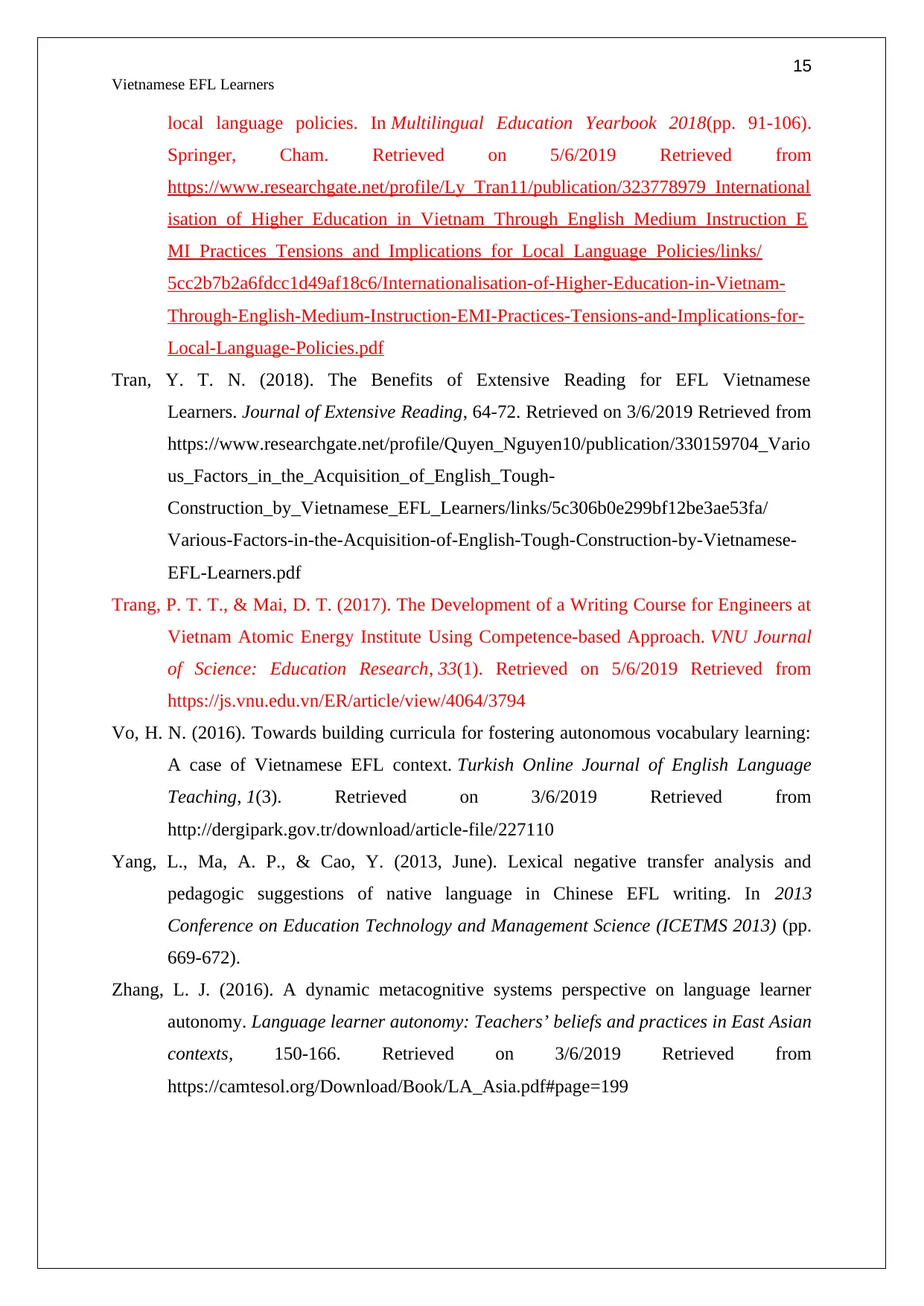
15
Vietnamese EFL Learners
local language policies. In Multilingual Education Yearbook 2018(pp. 91-106).
Springer, Cham. Retrieved on 5/6/2019 Retrieved from
https://www.researchgate.net/profile/Ly_Tran11/publication/323778979_International
isation_of_Higher_Education_in_Vietnam_Through_English_Medium_Instruction_E
MI_Practices_Tensions_and_Implications_for_Local_Language_Policies/links/
5cc2b7b2a6fdcc1d49af18c6/Internationalisation-of-Higher-Education-in-Vietnam-
Through-English-Medium-Instruction-EMI-Practices-Tensions-and-Implications-for-
Local-Language-Policies.pdf
Tran, Y. T. N. (2018). The Benefits of Extensive Reading for EFL Vietnamese
Learners. Journal of Extensive Reading, 64-72. Retrieved on 3/6/2019 Retrieved from
https://www.researchgate.net/profile/Quyen_Nguyen10/publication/330159704_Vario
us_Factors_in_the_Acquisition_of_English_Tough-
Construction_by_Vietnamese_EFL_Learners/links/5c306b0e299bf12be3ae53fa/
Various-Factors-in-the-Acquisition-of-English-Tough-Construction-by-Vietnamese-
EFL-Learners.pdf
Trang, P. T. T., & Mai, D. T. (2017). The Development of a Writing Course for Engineers at
Vietnam Atomic Energy Institute Using Competence-based Approach. VNU Journal
of Science: Education Research, 33(1). Retrieved on 5/6/2019 Retrieved from
https://js.vnu.edu.vn/ER/article/view/4064/3794
Vo, H. N. (2016). Towards building curricula for fostering autonomous vocabulary learning:
A case of Vietnamese EFL context. Turkish Online Journal of English Language
Teaching, 1(3). Retrieved on 3/6/2019 Retrieved from
http://dergipark.gov.tr/download/article-file/227110
Yang, L., Ma, A. P., & Cao, Y. (2013, June). Lexical negative transfer analysis and
pedagogic suggestions of native language in Chinese EFL writing. In 2013
Conference on Education Technology and Management Science (ICETMS 2013) (pp.
669-672).
Zhang, L. J. (2016). A dynamic metacognitive systems perspective on language learner
autonomy. Language learner autonomy: Teachers’ beliefs and practices in East Asian
contexts, 150-166. Retrieved on 3/6/2019 Retrieved from
https://camtesol.org/Download/Book/LA_Asia.pdf#page=199
Vietnamese EFL Learners
local language policies. In Multilingual Education Yearbook 2018(pp. 91-106).
Springer, Cham. Retrieved on 5/6/2019 Retrieved from
https://www.researchgate.net/profile/Ly_Tran11/publication/323778979_International
isation_of_Higher_Education_in_Vietnam_Through_English_Medium_Instruction_E
MI_Practices_Tensions_and_Implications_for_Local_Language_Policies/links/
5cc2b7b2a6fdcc1d49af18c6/Internationalisation-of-Higher-Education-in-Vietnam-
Through-English-Medium-Instruction-EMI-Practices-Tensions-and-Implications-for-
Local-Language-Policies.pdf
Tran, Y. T. N. (2018). The Benefits of Extensive Reading for EFL Vietnamese
Learners. Journal of Extensive Reading, 64-72. Retrieved on 3/6/2019 Retrieved from
https://www.researchgate.net/profile/Quyen_Nguyen10/publication/330159704_Vario
us_Factors_in_the_Acquisition_of_English_Tough-
Construction_by_Vietnamese_EFL_Learners/links/5c306b0e299bf12be3ae53fa/
Various-Factors-in-the-Acquisition-of-English-Tough-Construction-by-Vietnamese-
EFL-Learners.pdf
Trang, P. T. T., & Mai, D. T. (2017). The Development of a Writing Course for Engineers at
Vietnam Atomic Energy Institute Using Competence-based Approach. VNU Journal
of Science: Education Research, 33(1). Retrieved on 5/6/2019 Retrieved from
https://js.vnu.edu.vn/ER/article/view/4064/3794
Vo, H. N. (2016). Towards building curricula for fostering autonomous vocabulary learning:
A case of Vietnamese EFL context. Turkish Online Journal of English Language
Teaching, 1(3). Retrieved on 3/6/2019 Retrieved from
http://dergipark.gov.tr/download/article-file/227110
Yang, L., Ma, A. P., & Cao, Y. (2013, June). Lexical negative transfer analysis and
pedagogic suggestions of native language in Chinese EFL writing. In 2013
Conference on Education Technology and Management Science (ICETMS 2013) (pp.
669-672).
Zhang, L. J. (2016). A dynamic metacognitive systems perspective on language learner
autonomy. Language learner autonomy: Teachers’ beliefs and practices in East Asian
contexts, 150-166. Retrieved on 3/6/2019 Retrieved from
https://camtesol.org/Download/Book/LA_Asia.pdf#page=199
1 out of 16
Related Documents
Your All-in-One AI-Powered Toolkit for Academic Success.
+13062052269
info@desklib.com
Available 24*7 on WhatsApp / Email
![[object Object]](/_next/static/media/star-bottom.7253800d.svg)
Unlock your academic potential
© 2024 | Zucol Services PVT LTD | All rights reserved.





